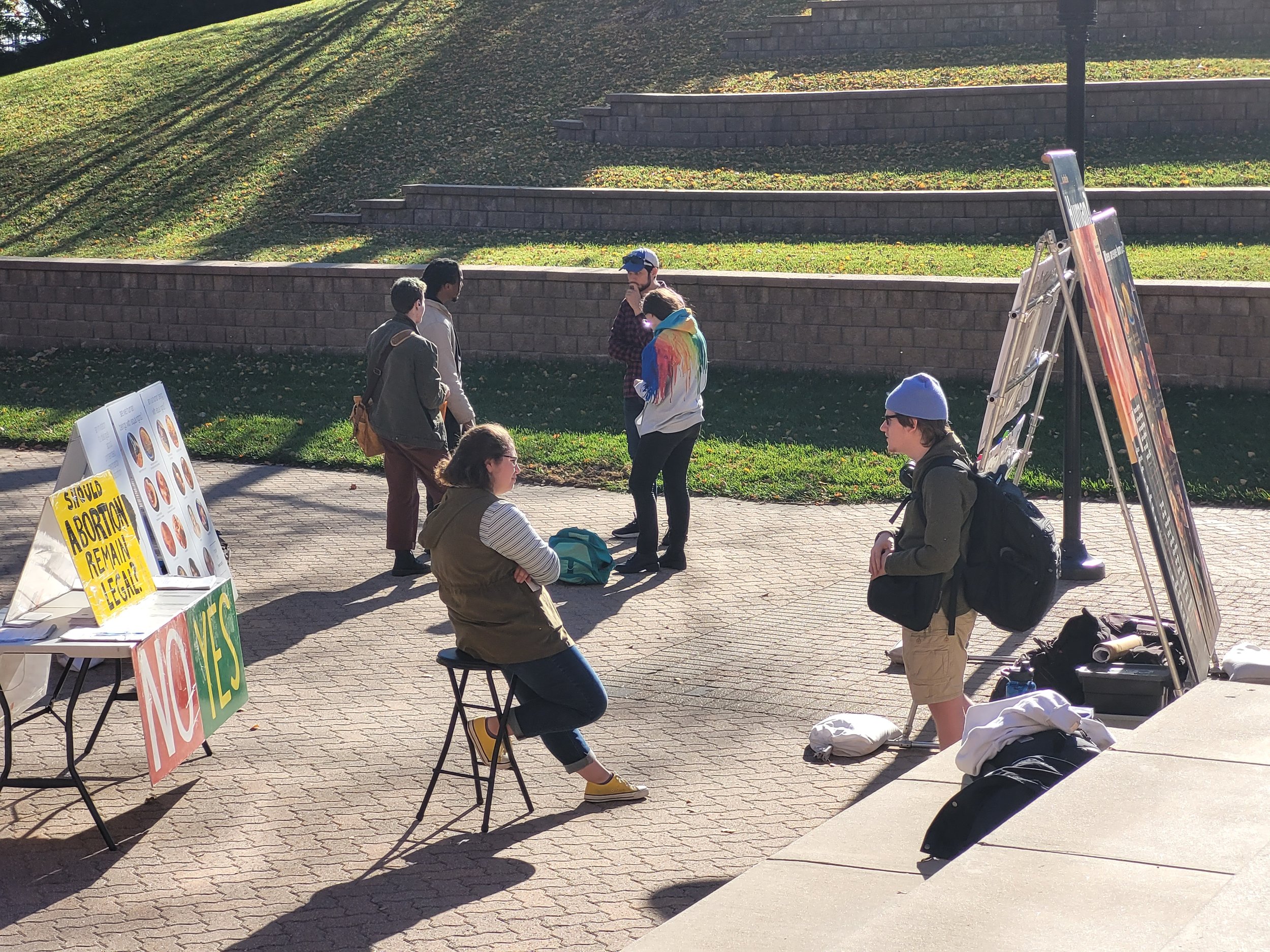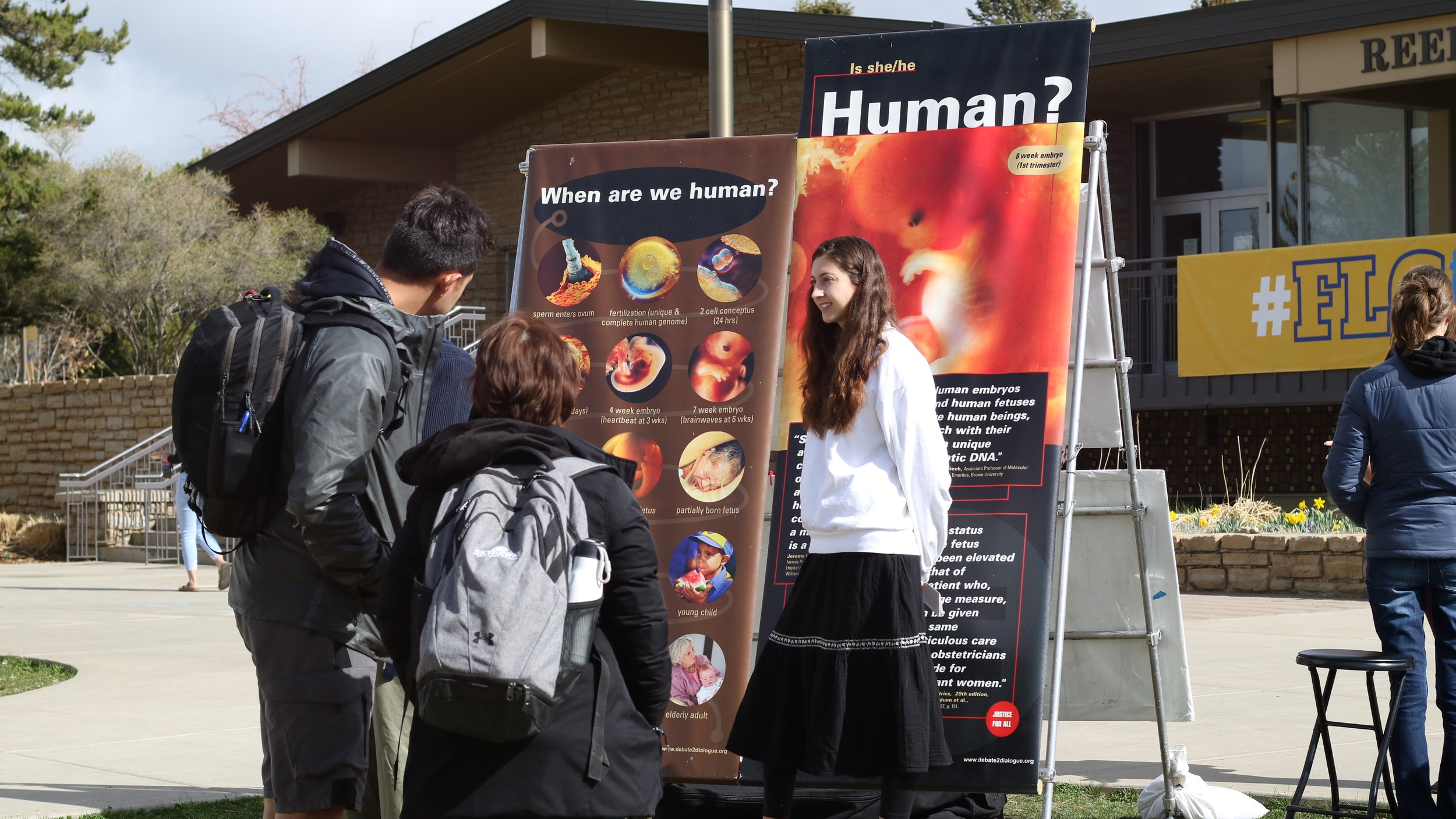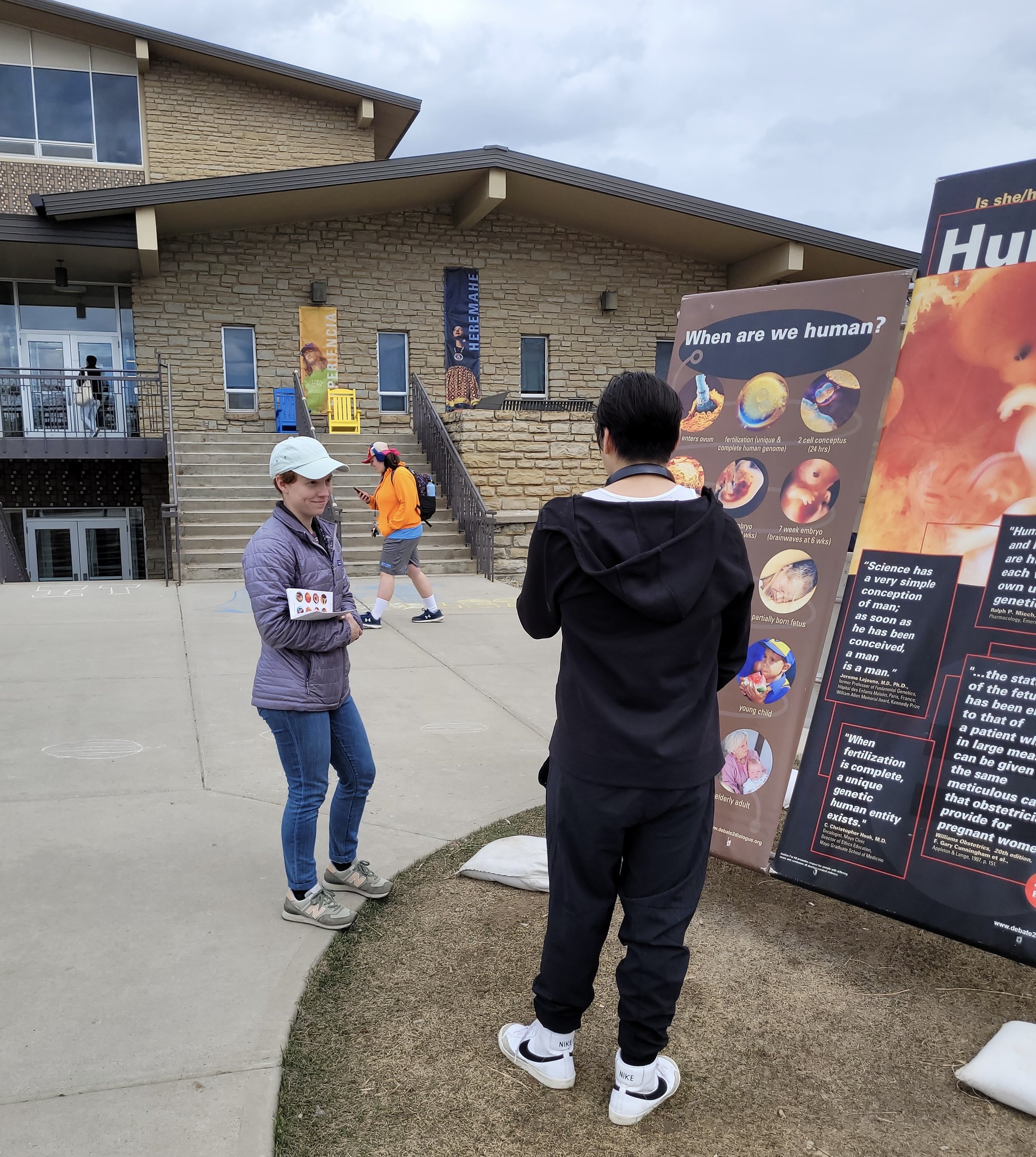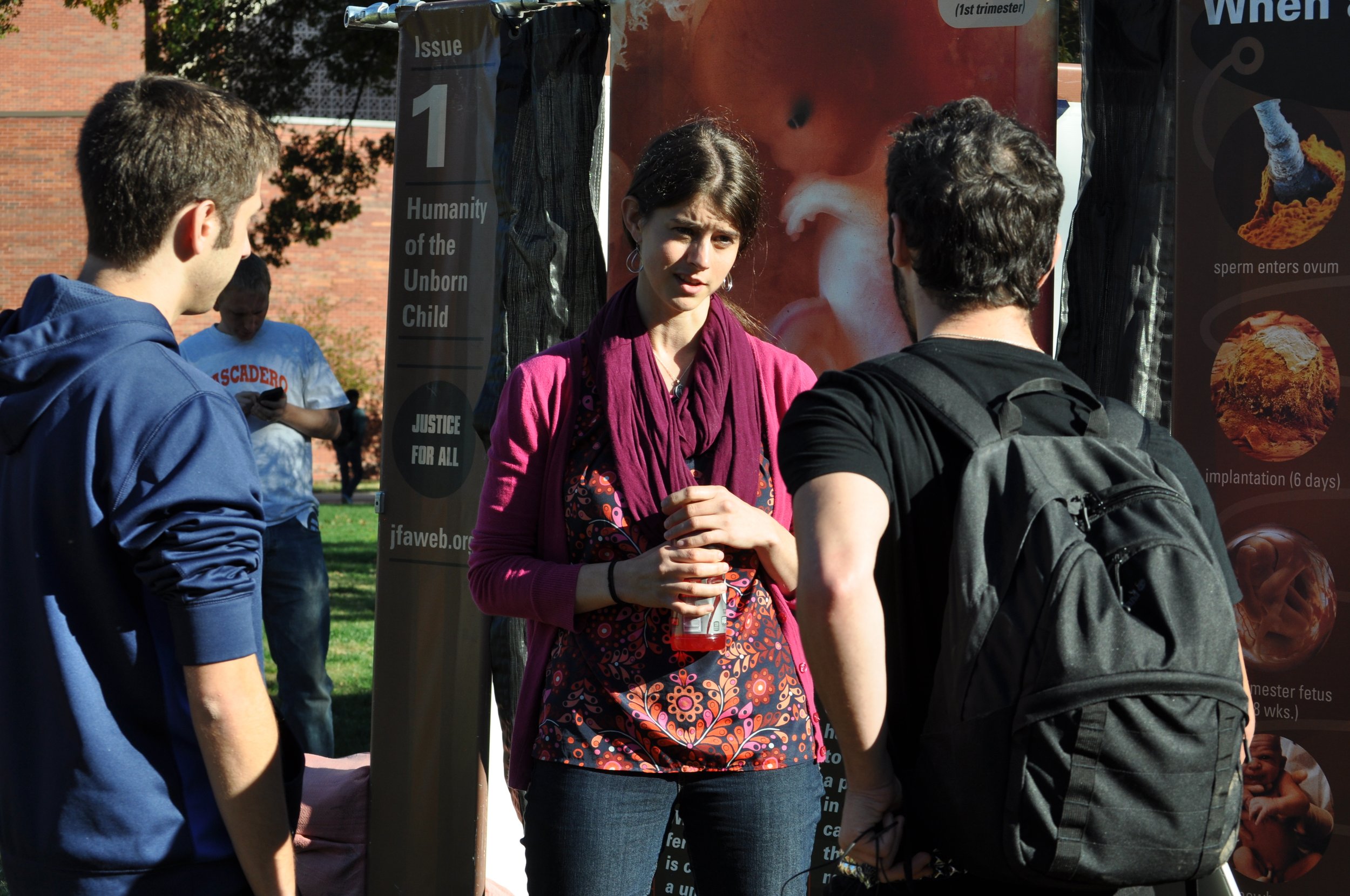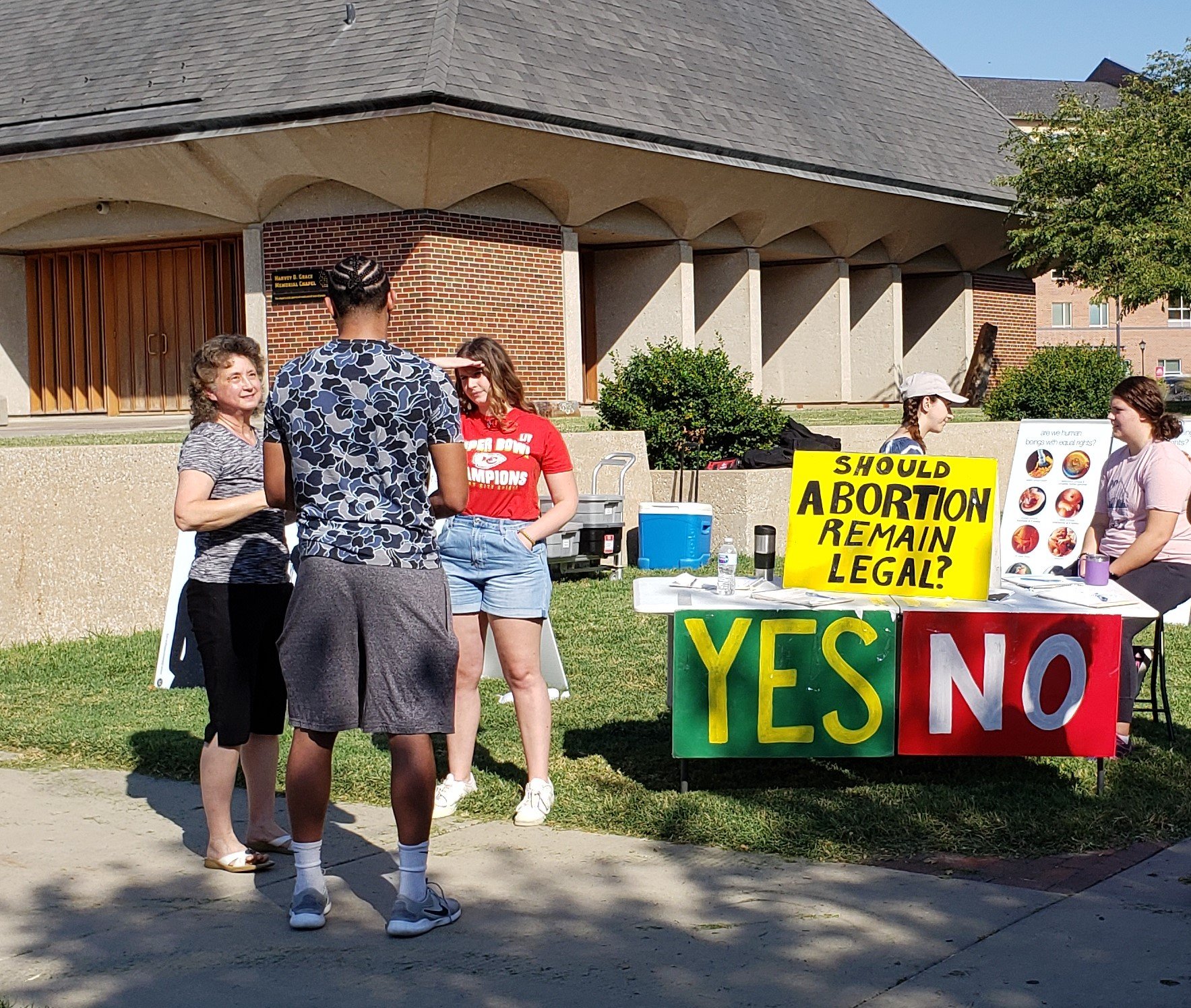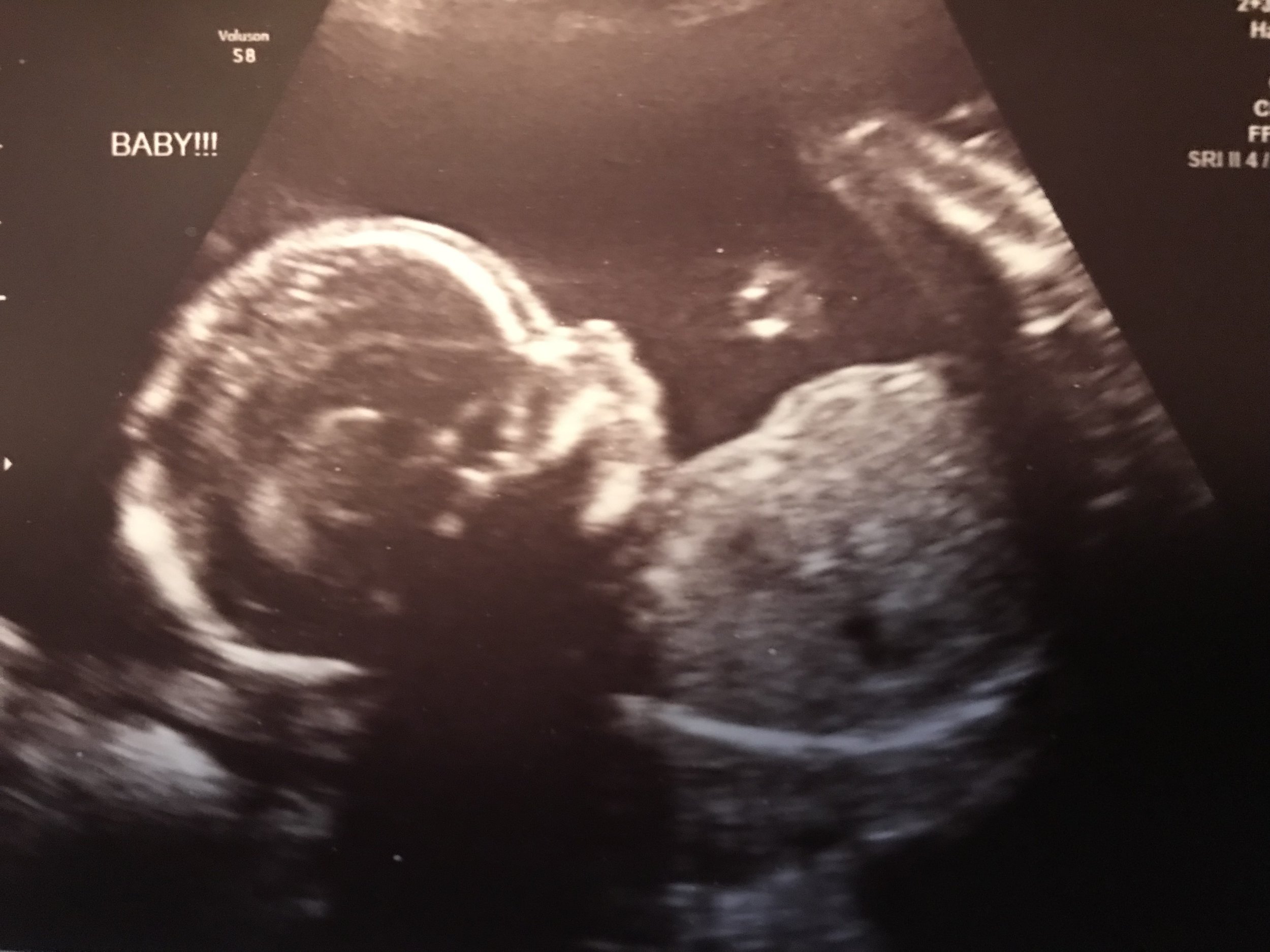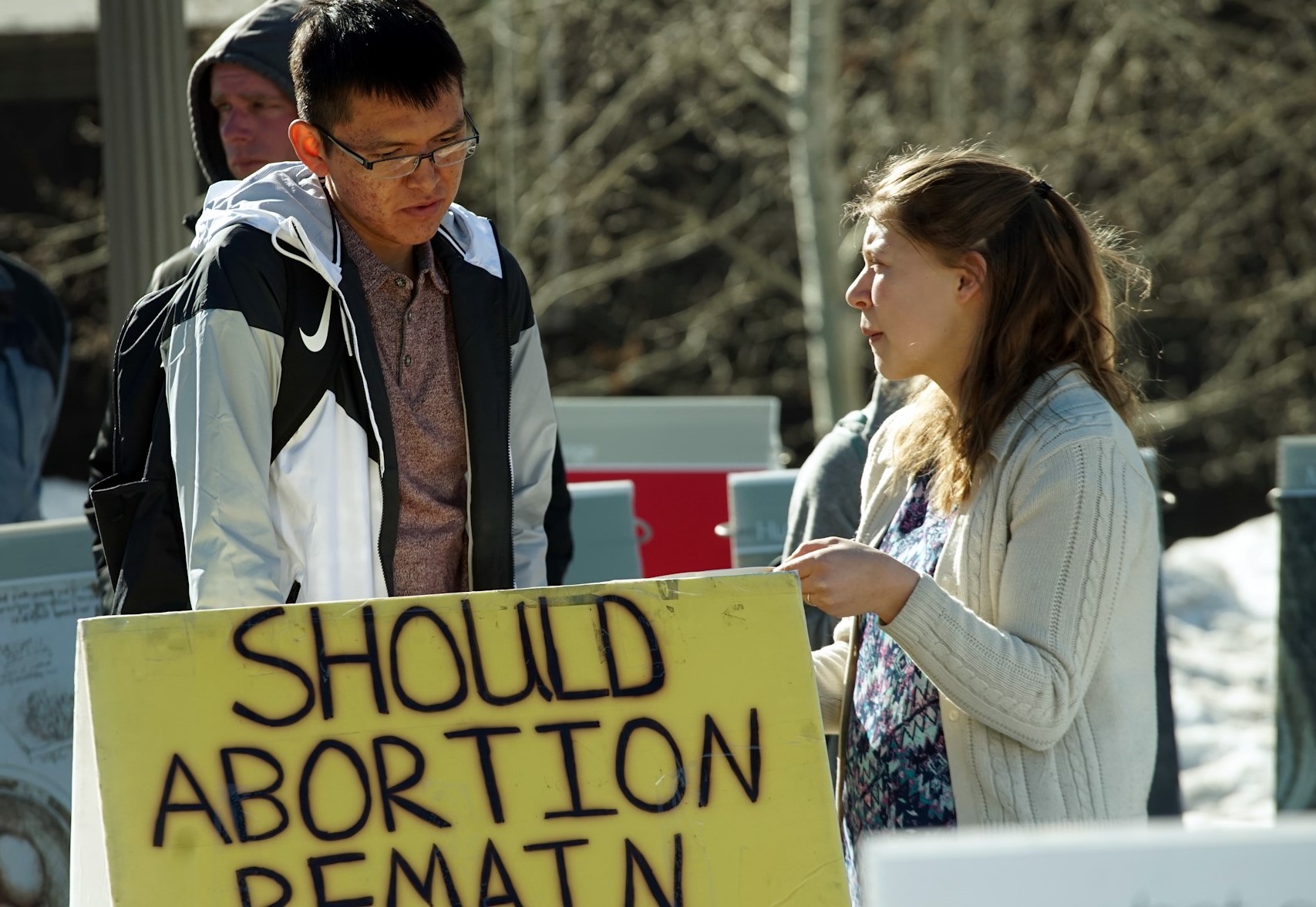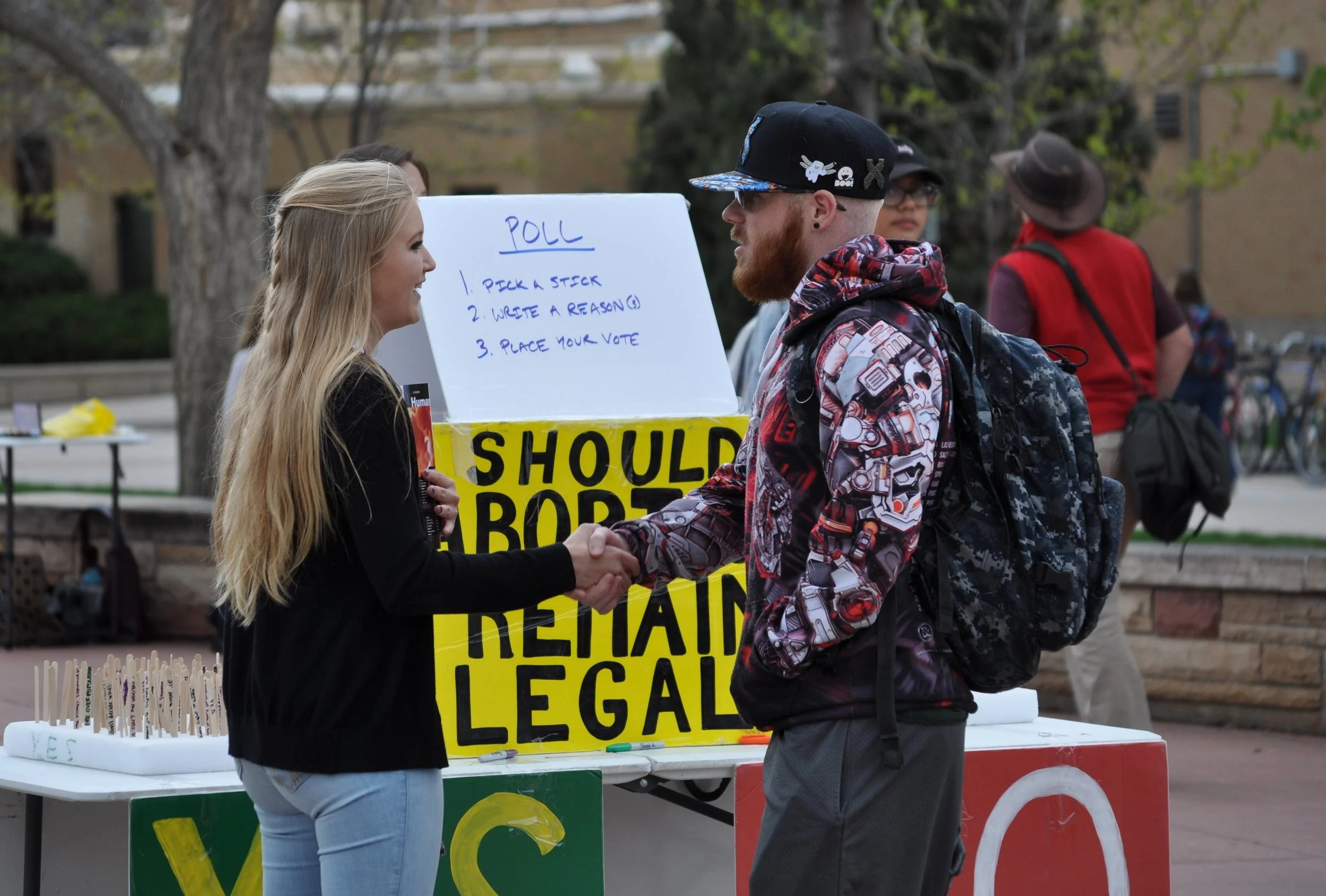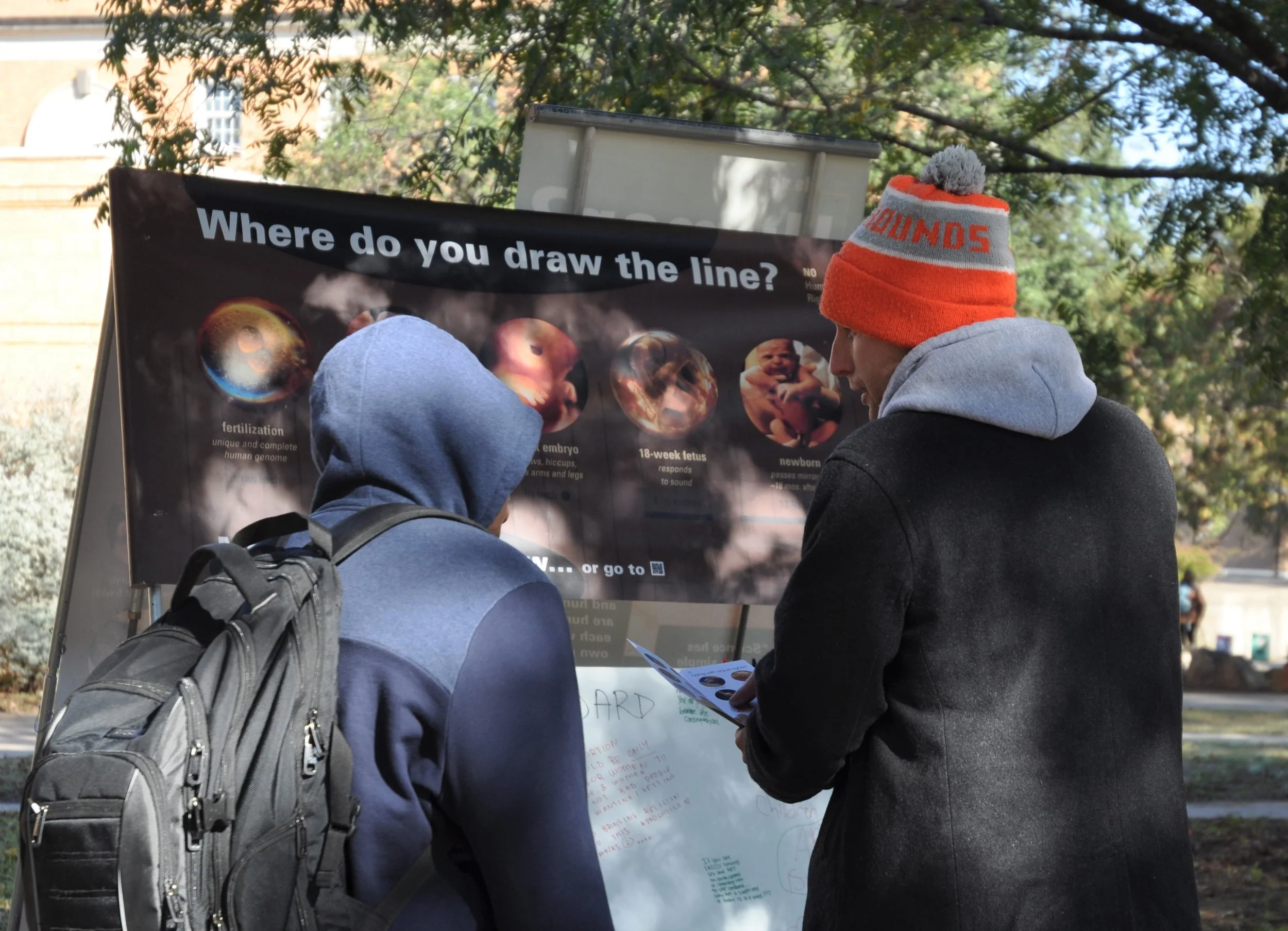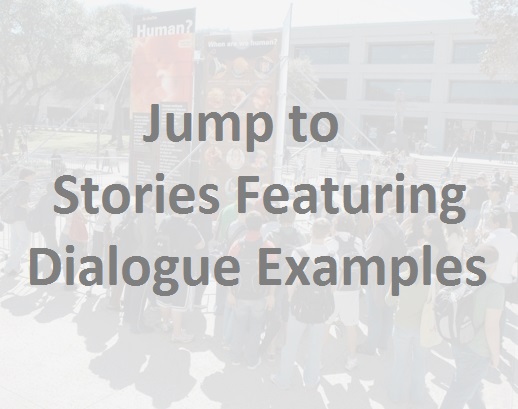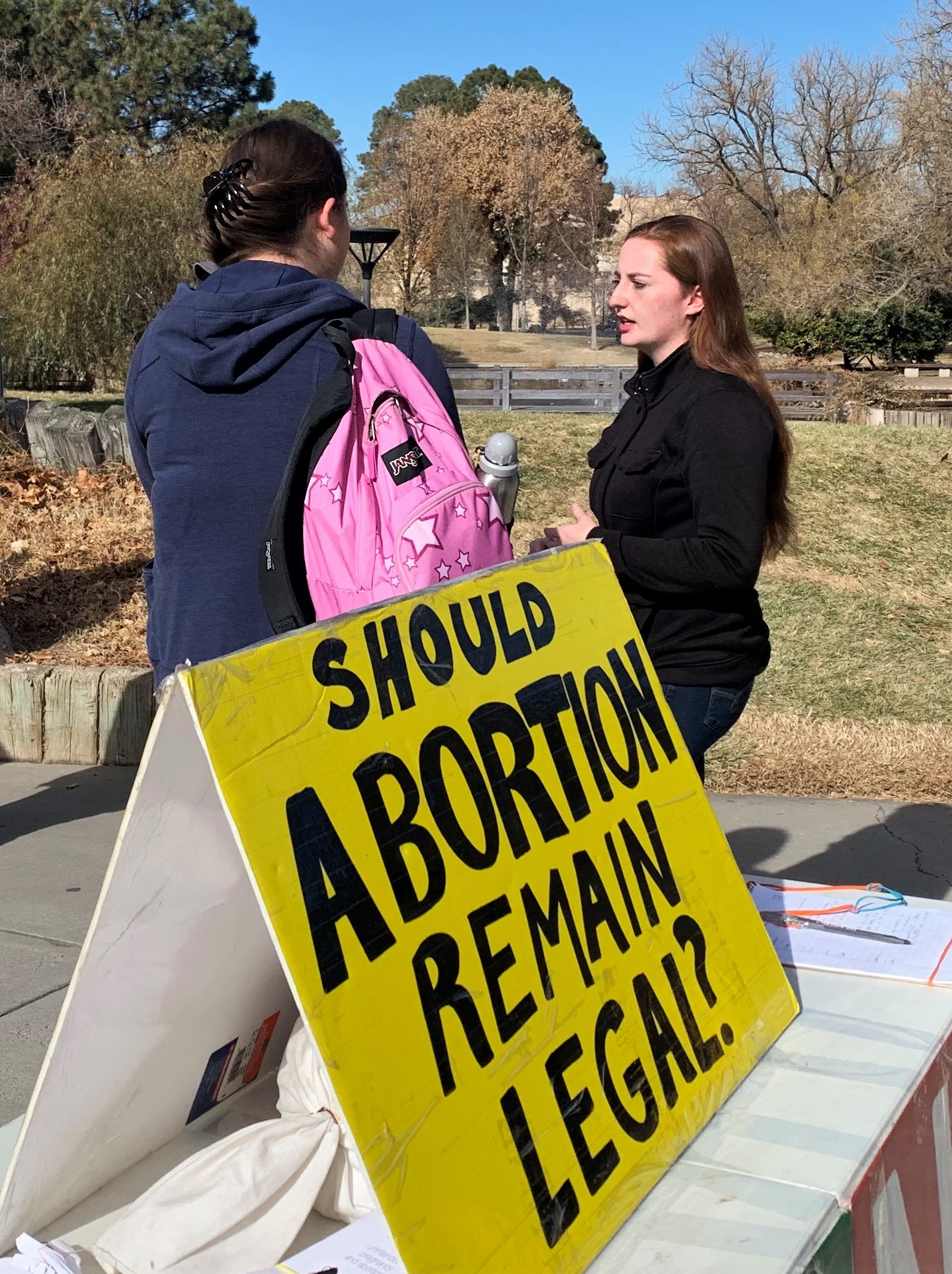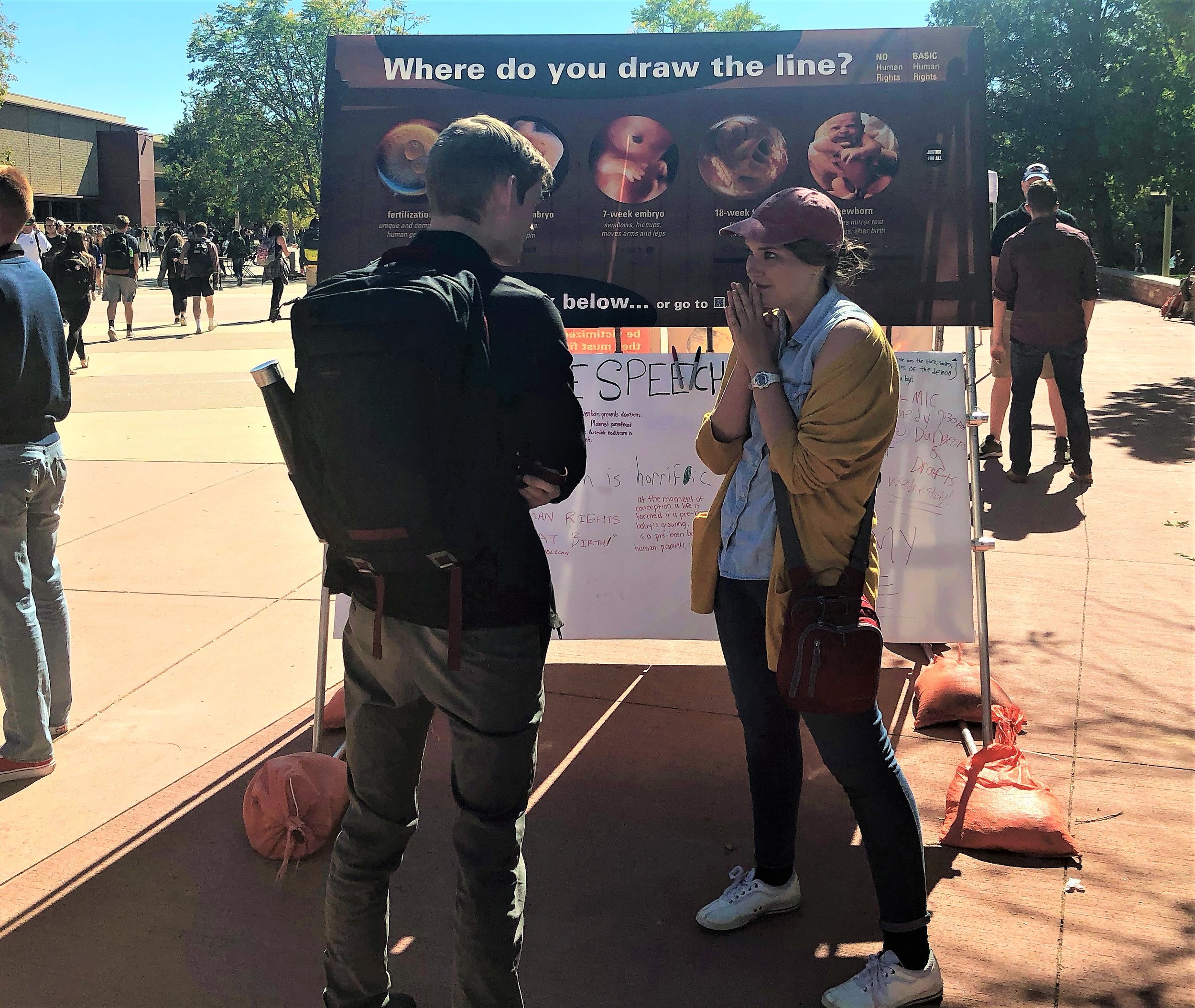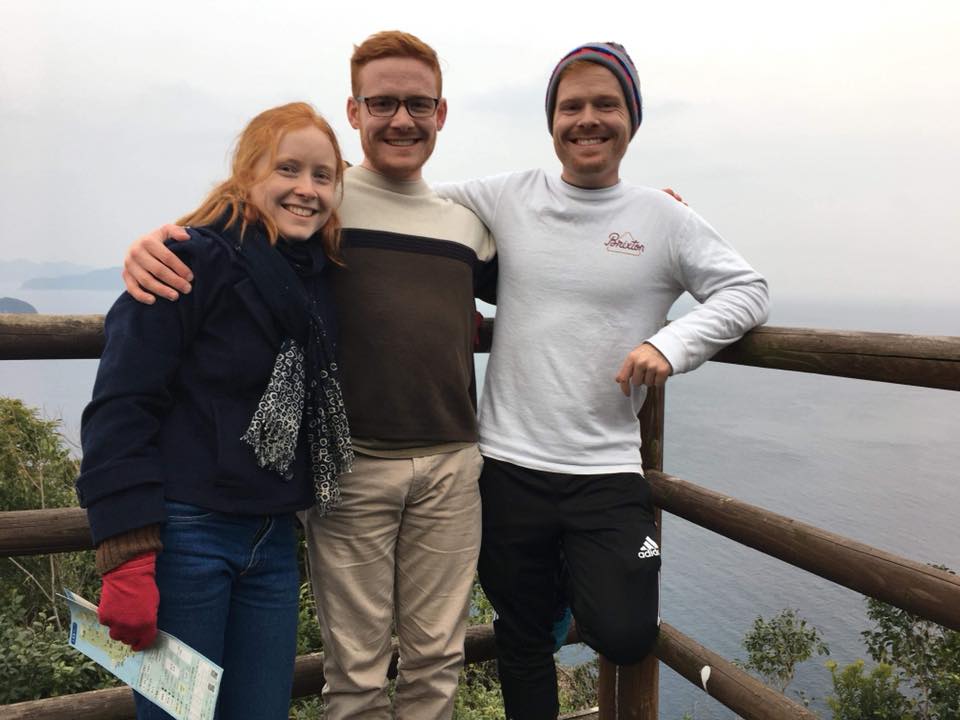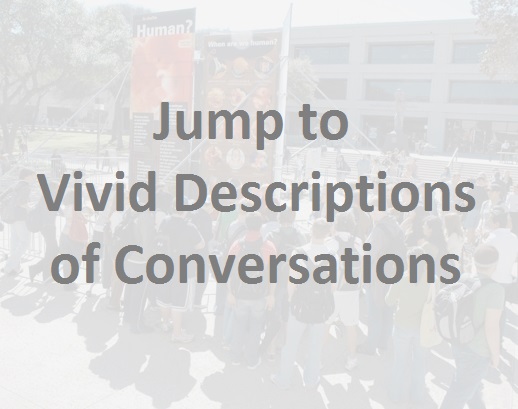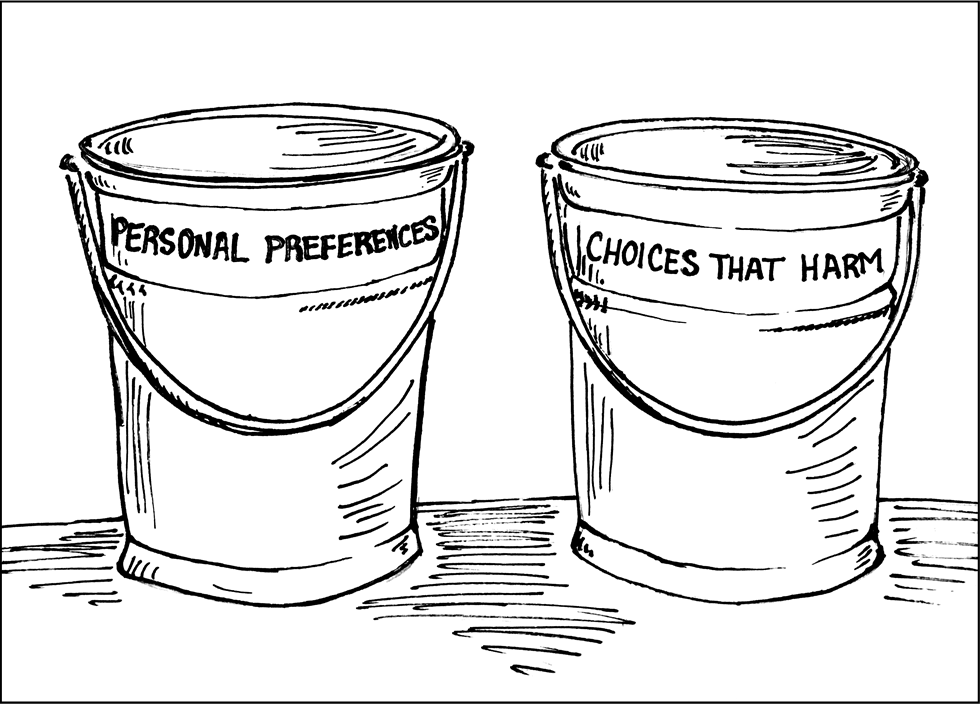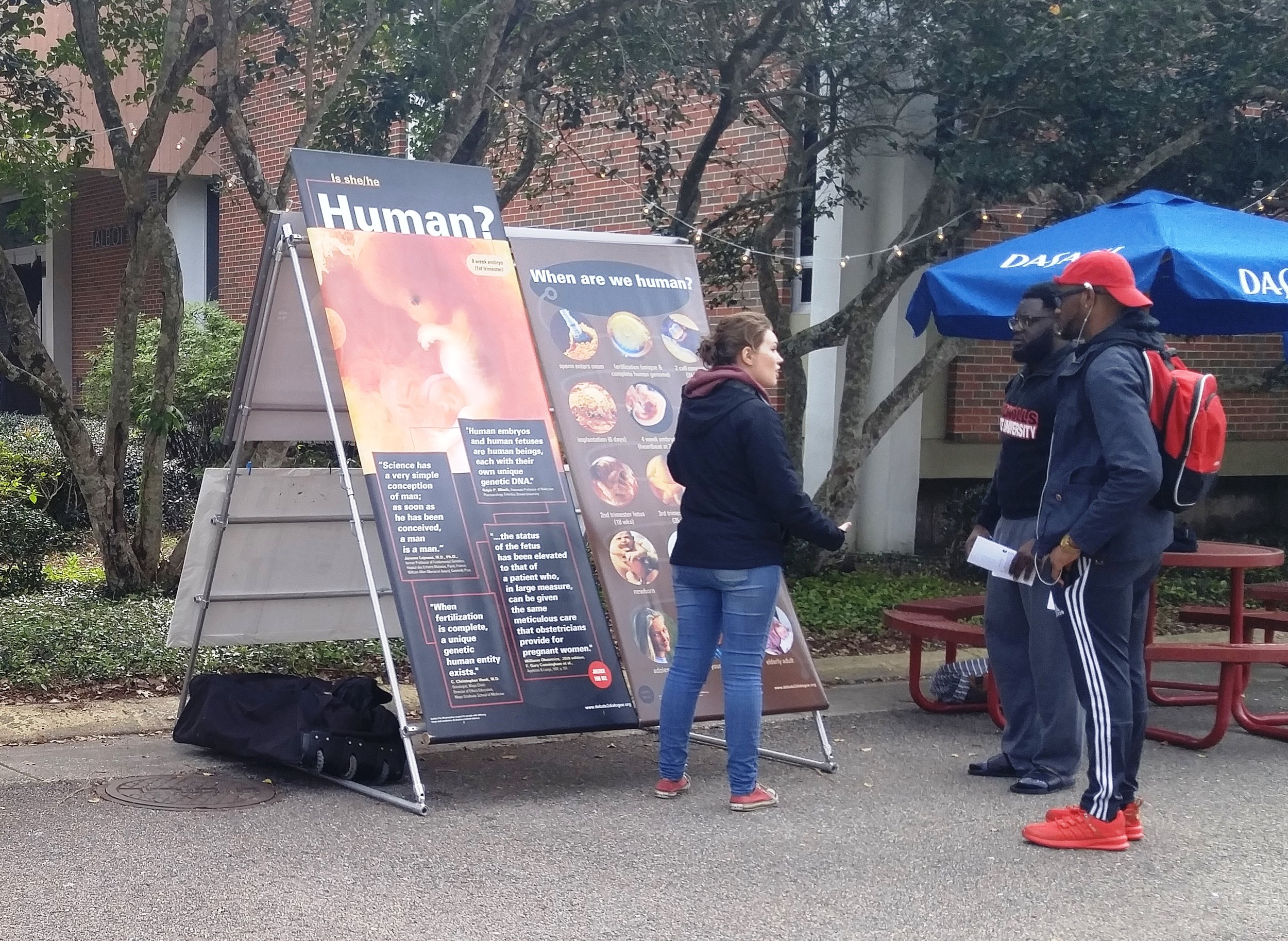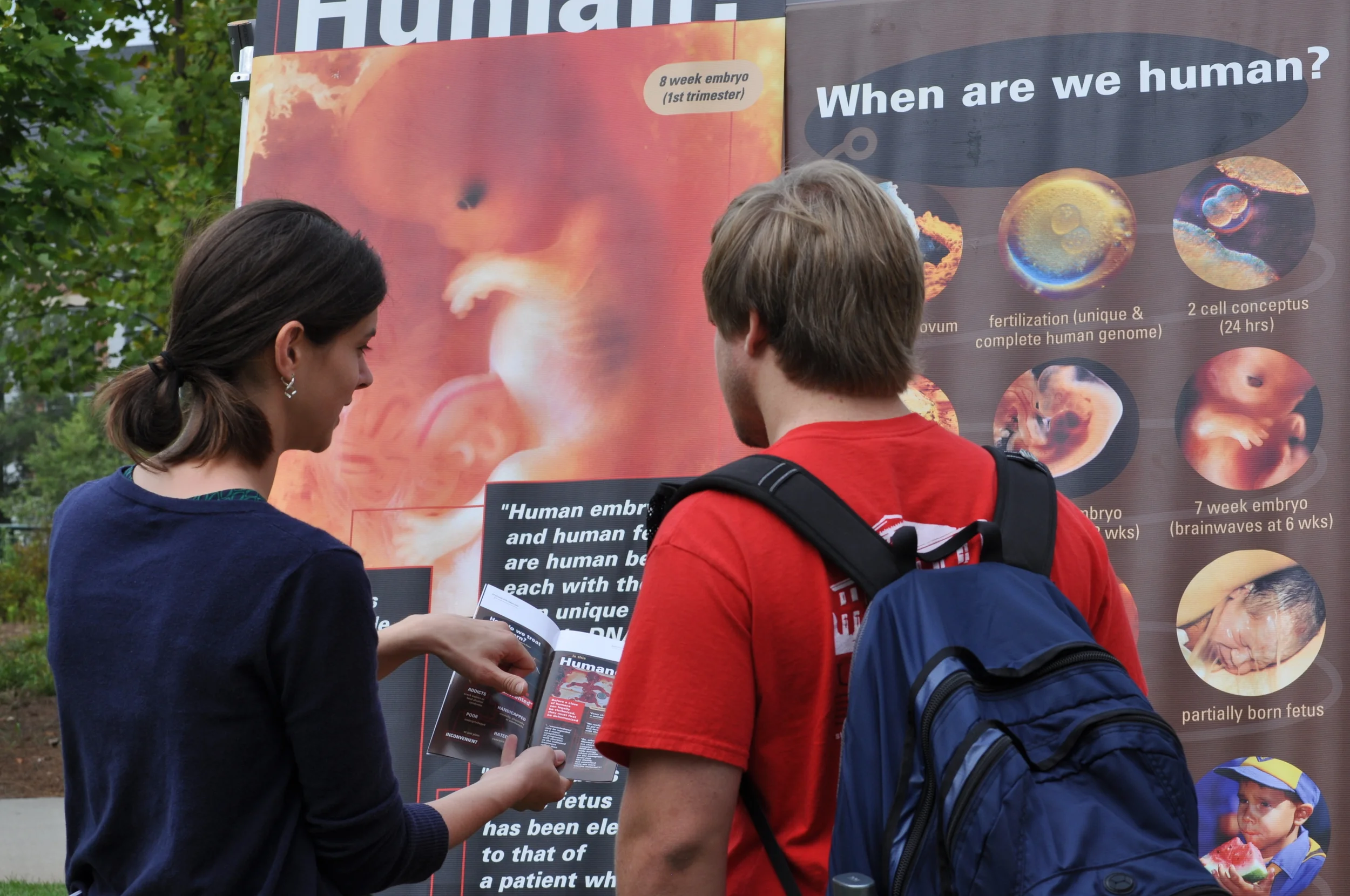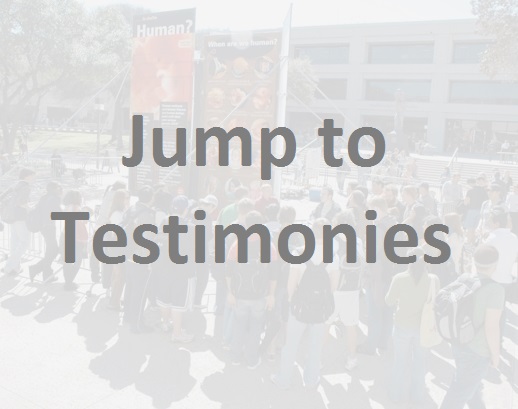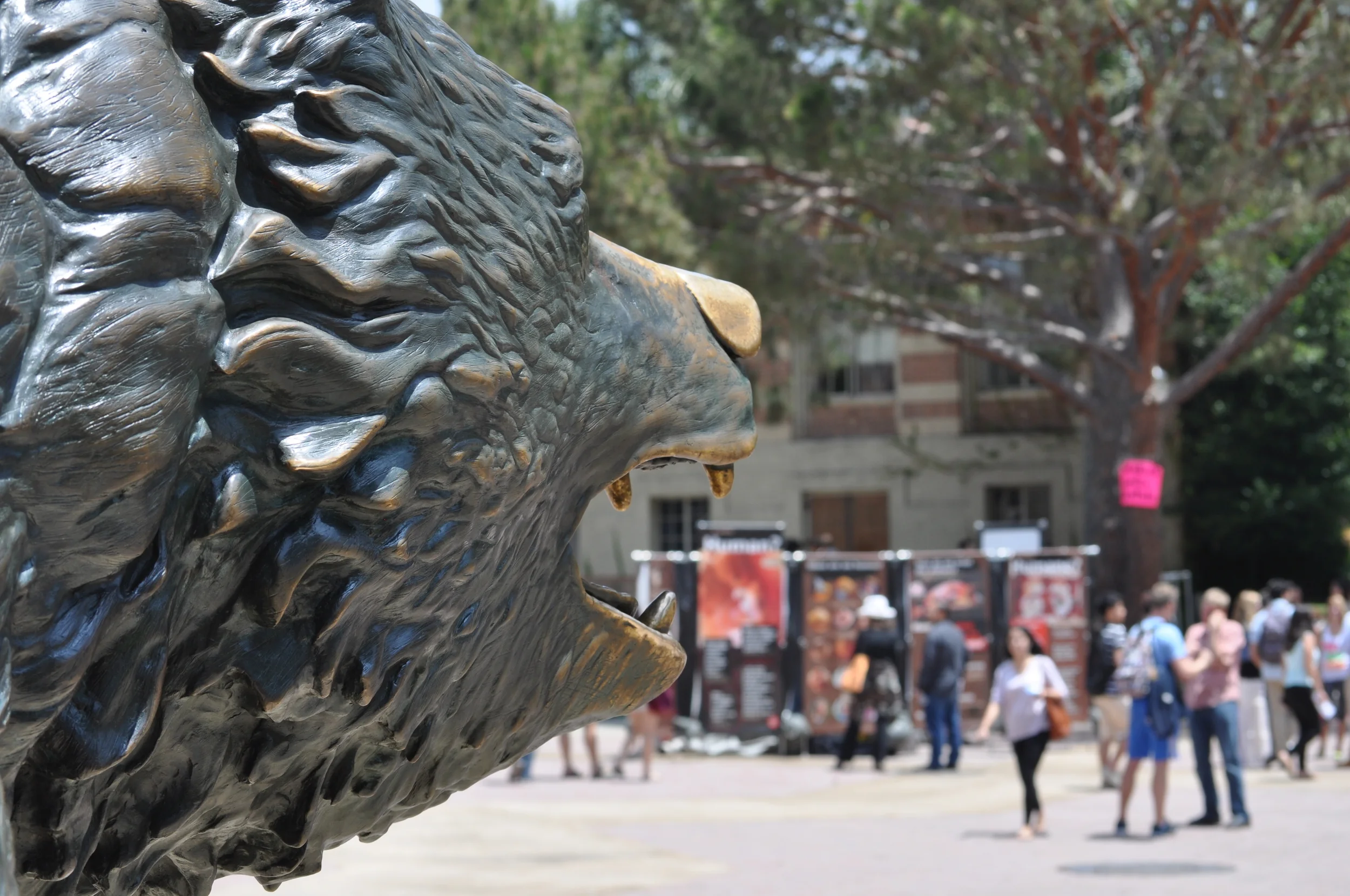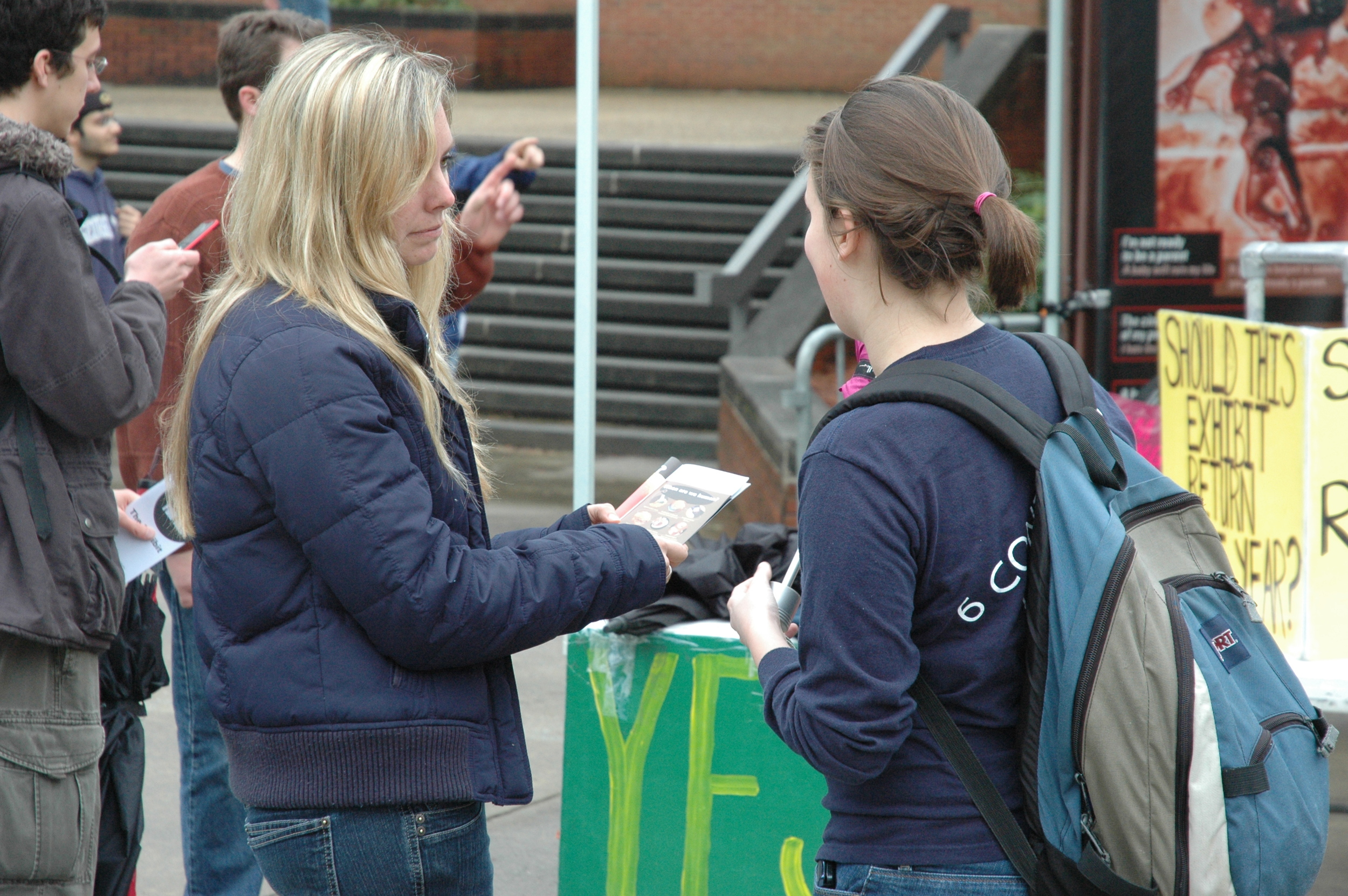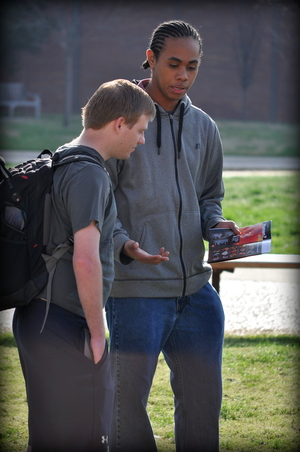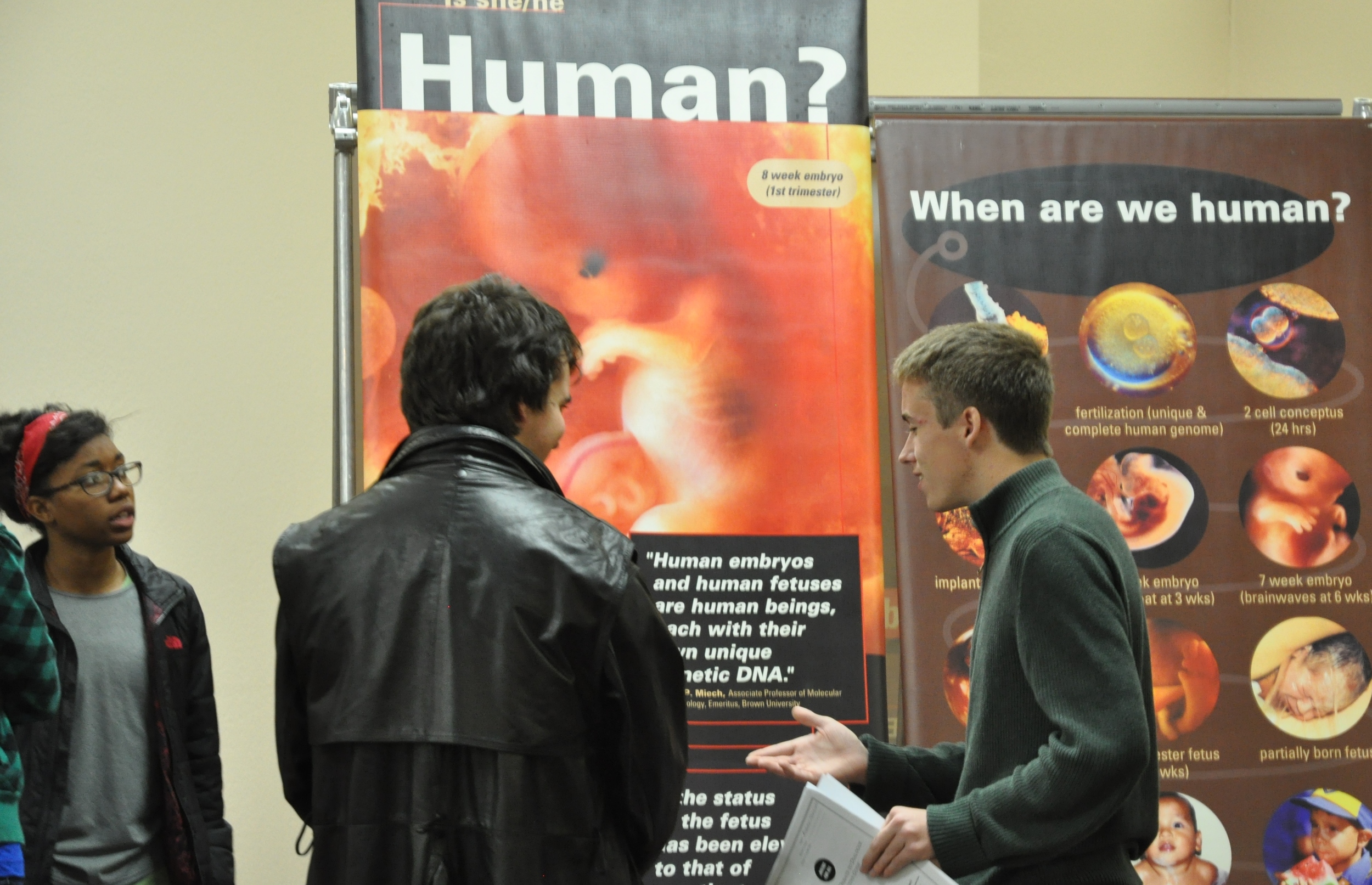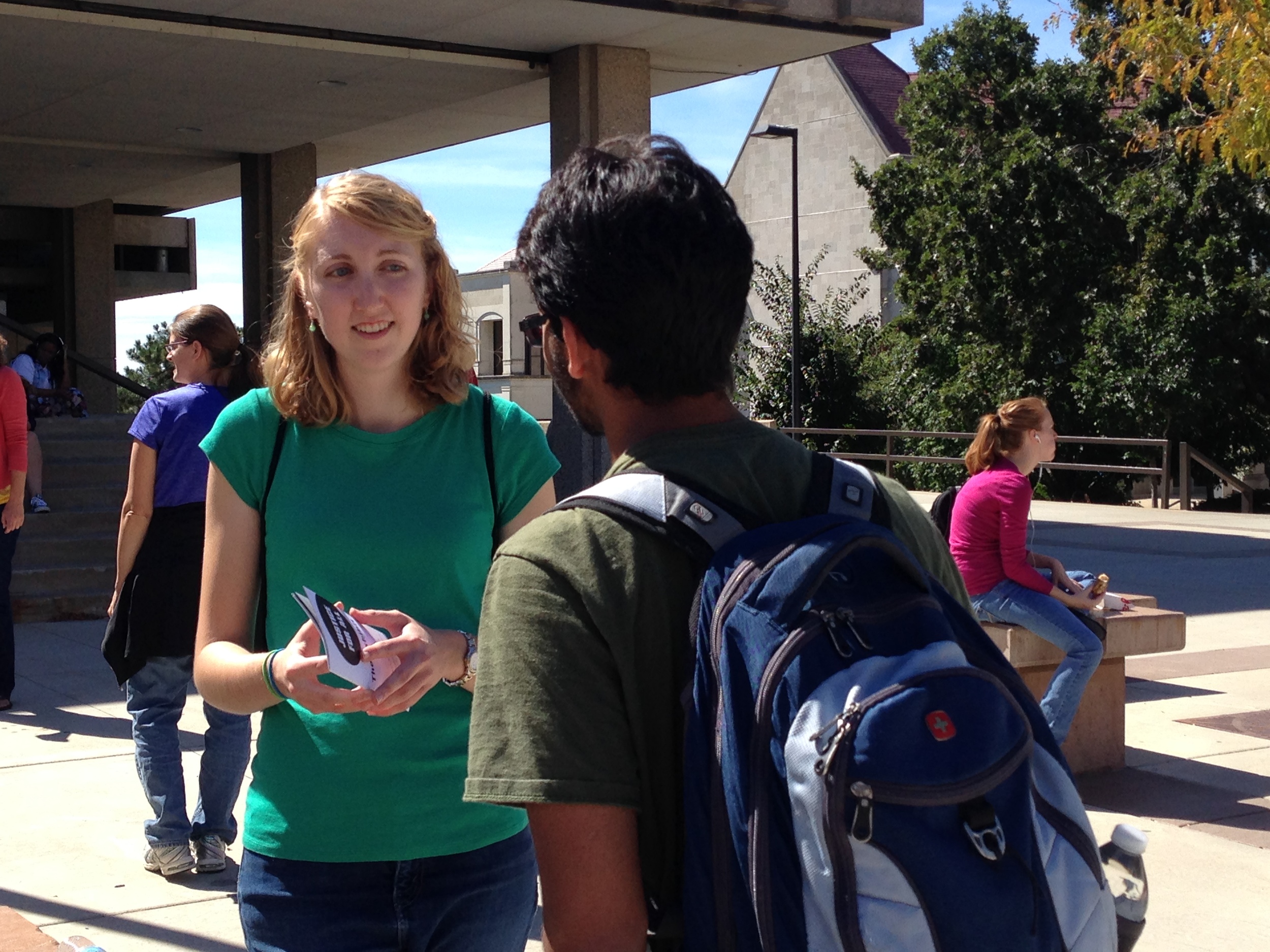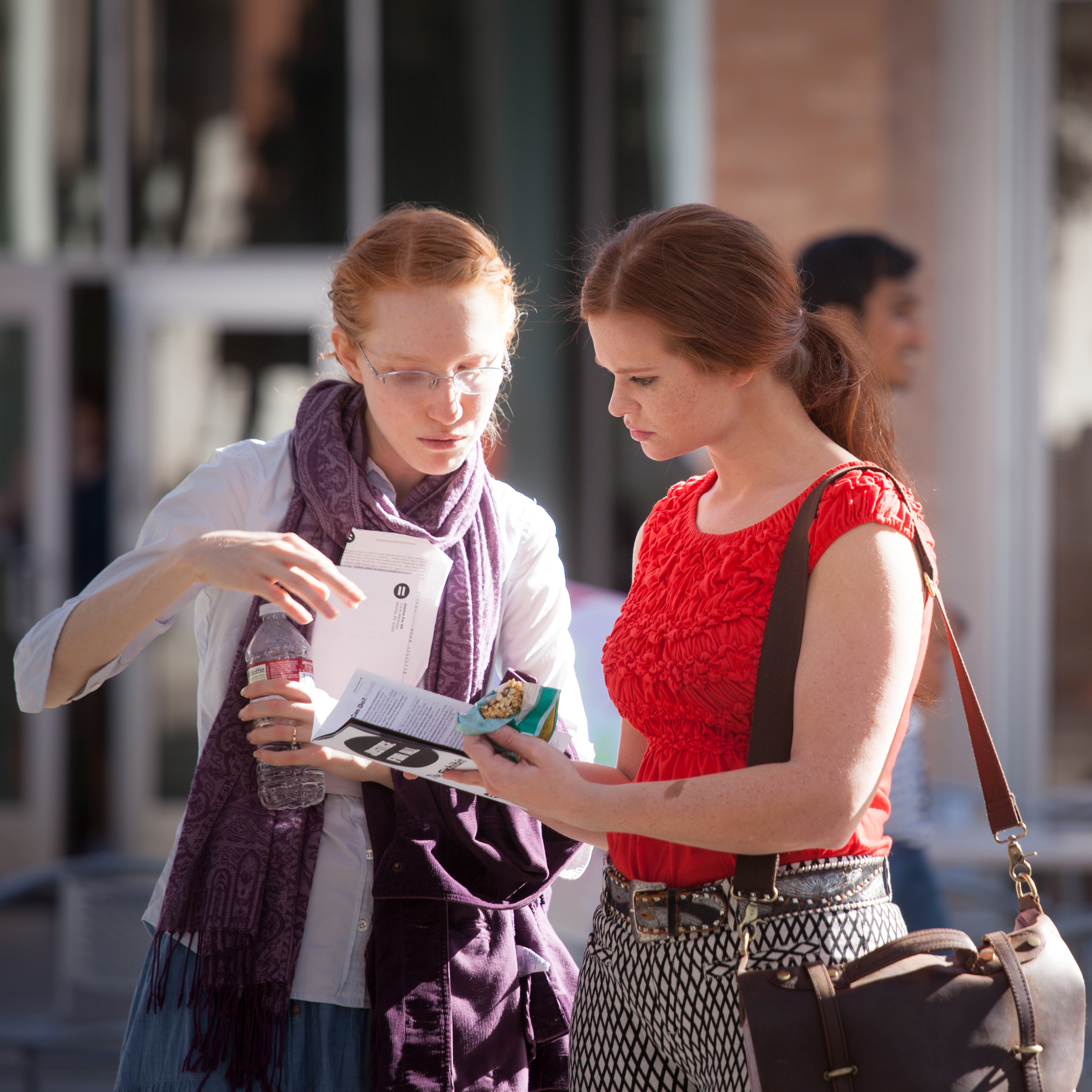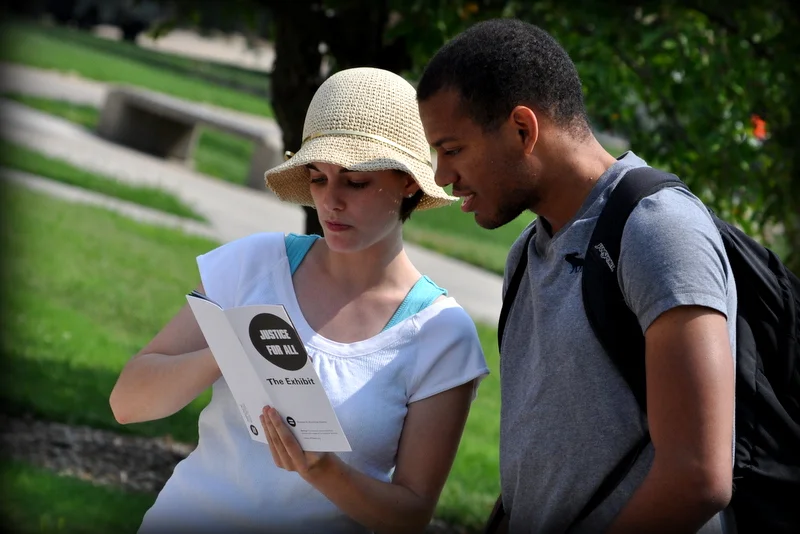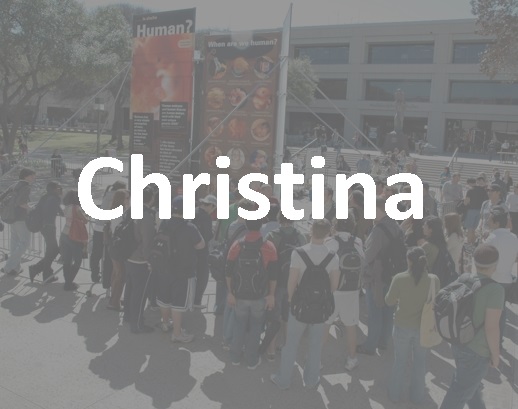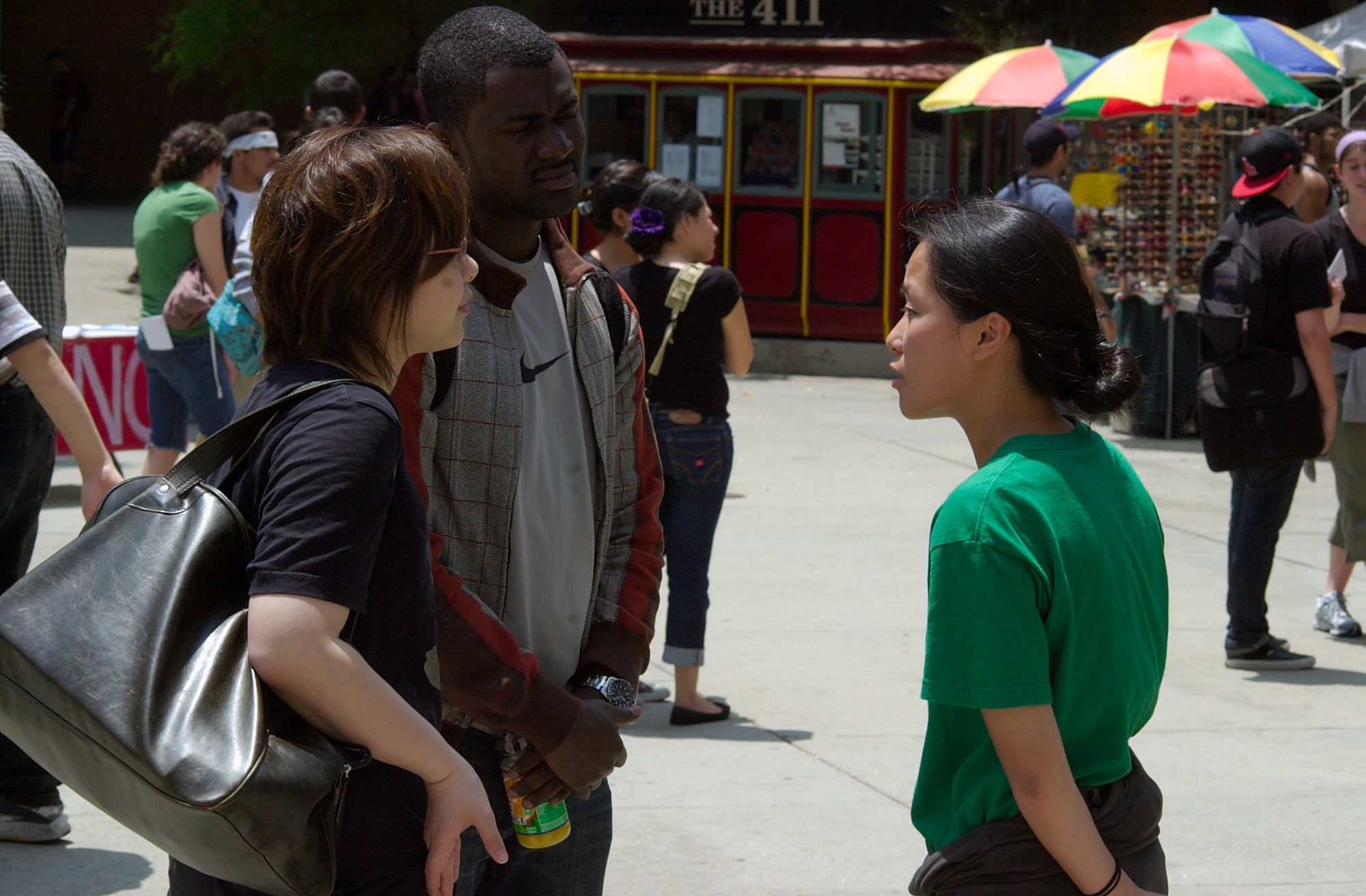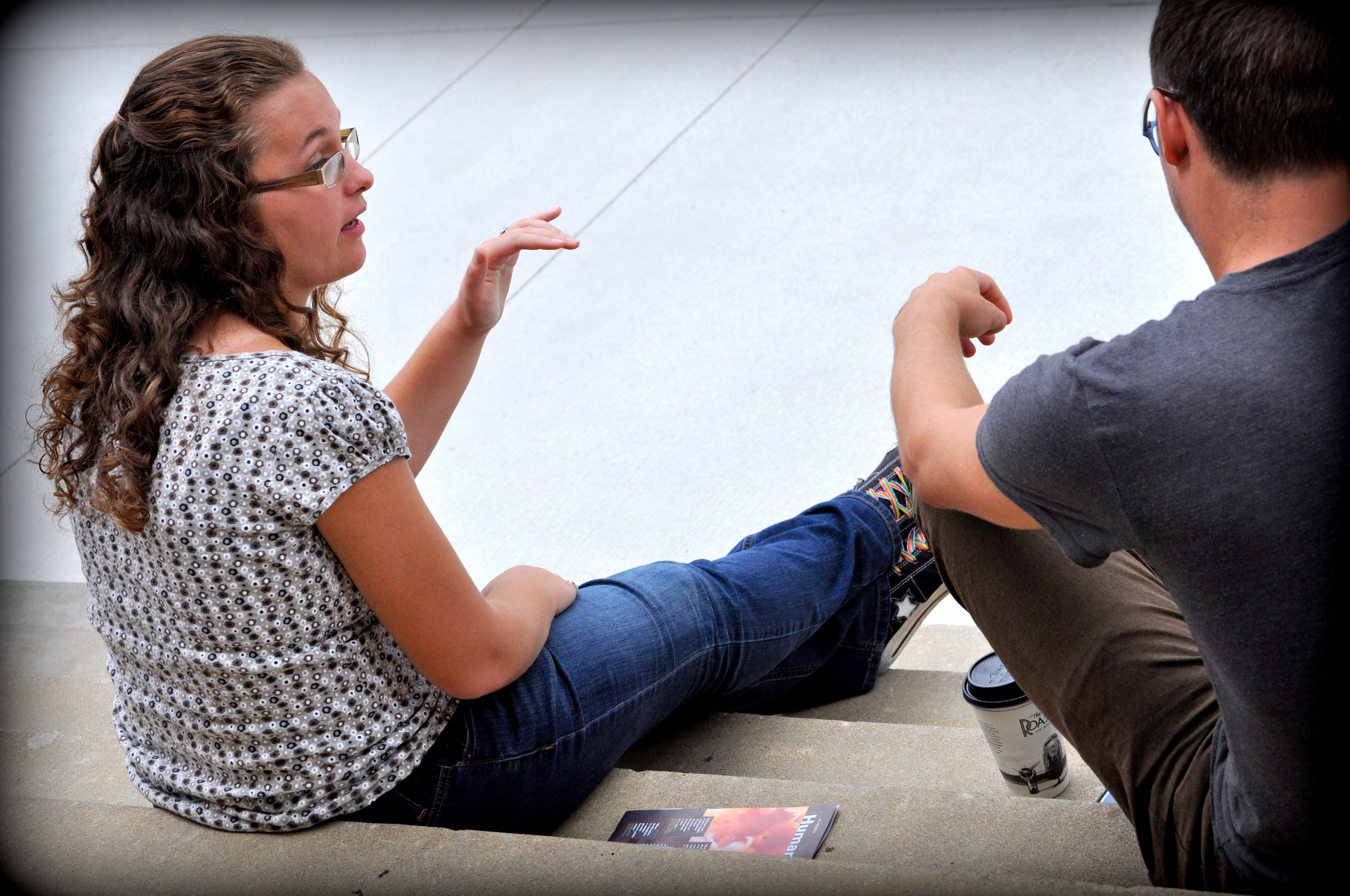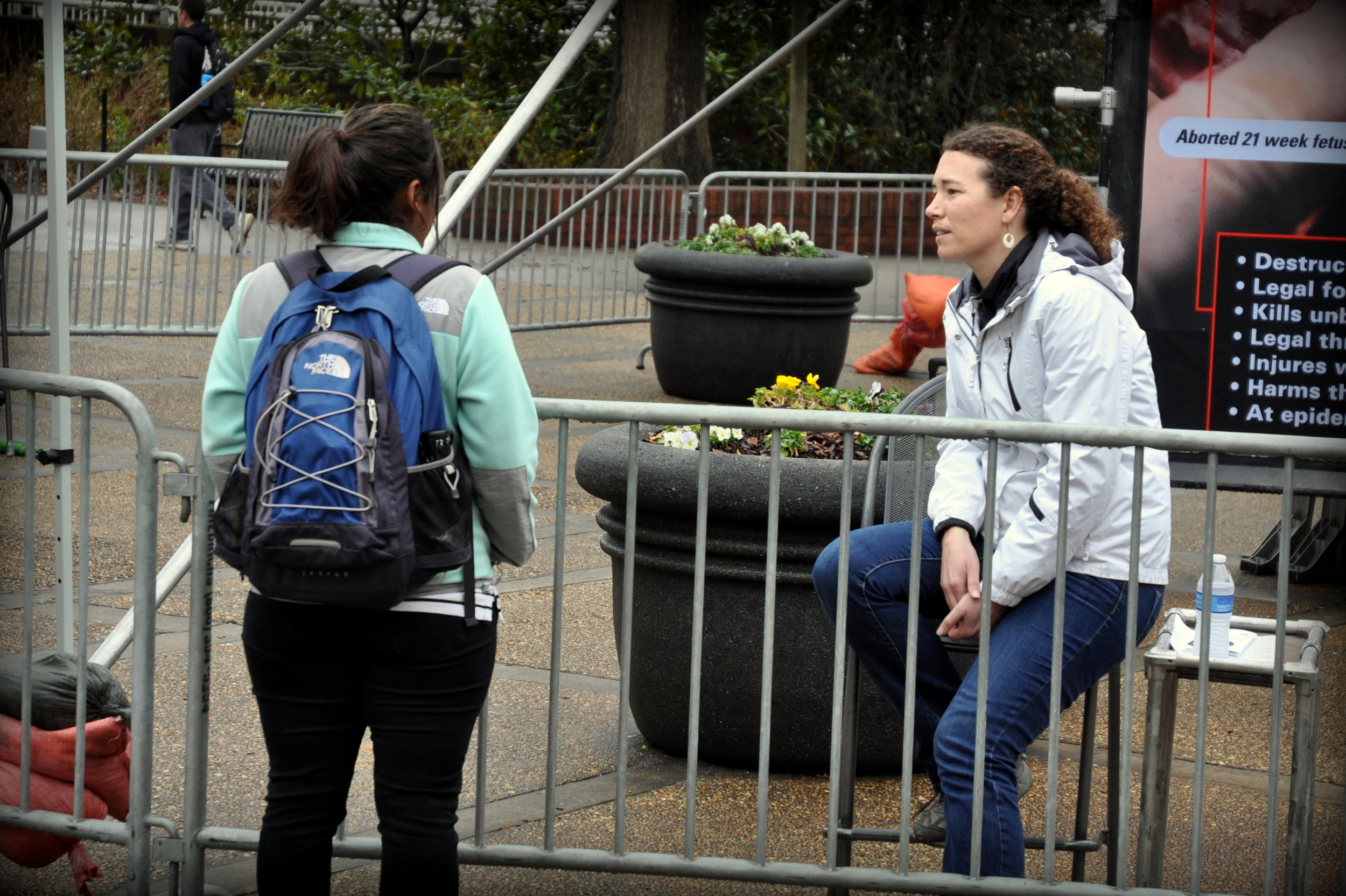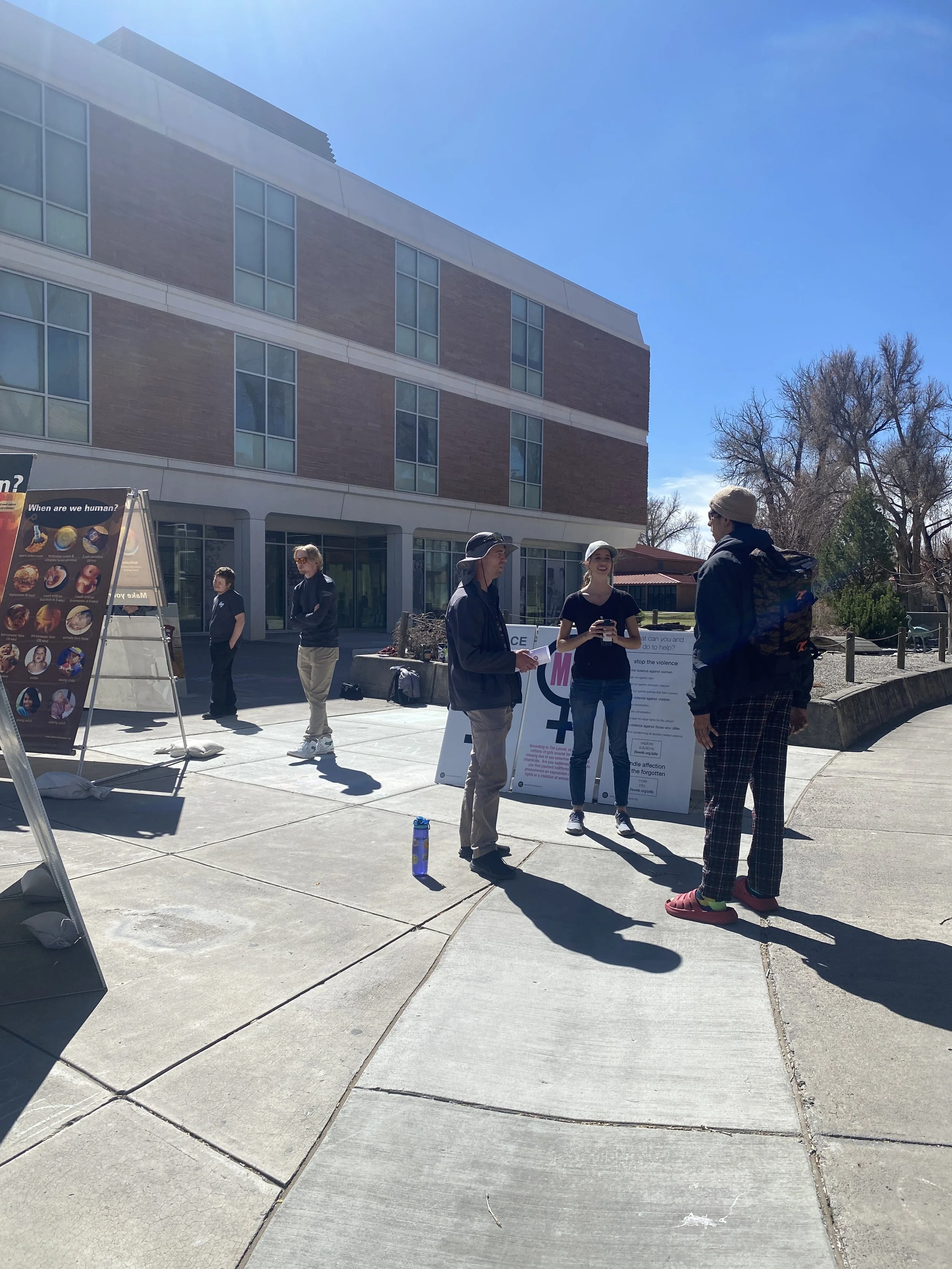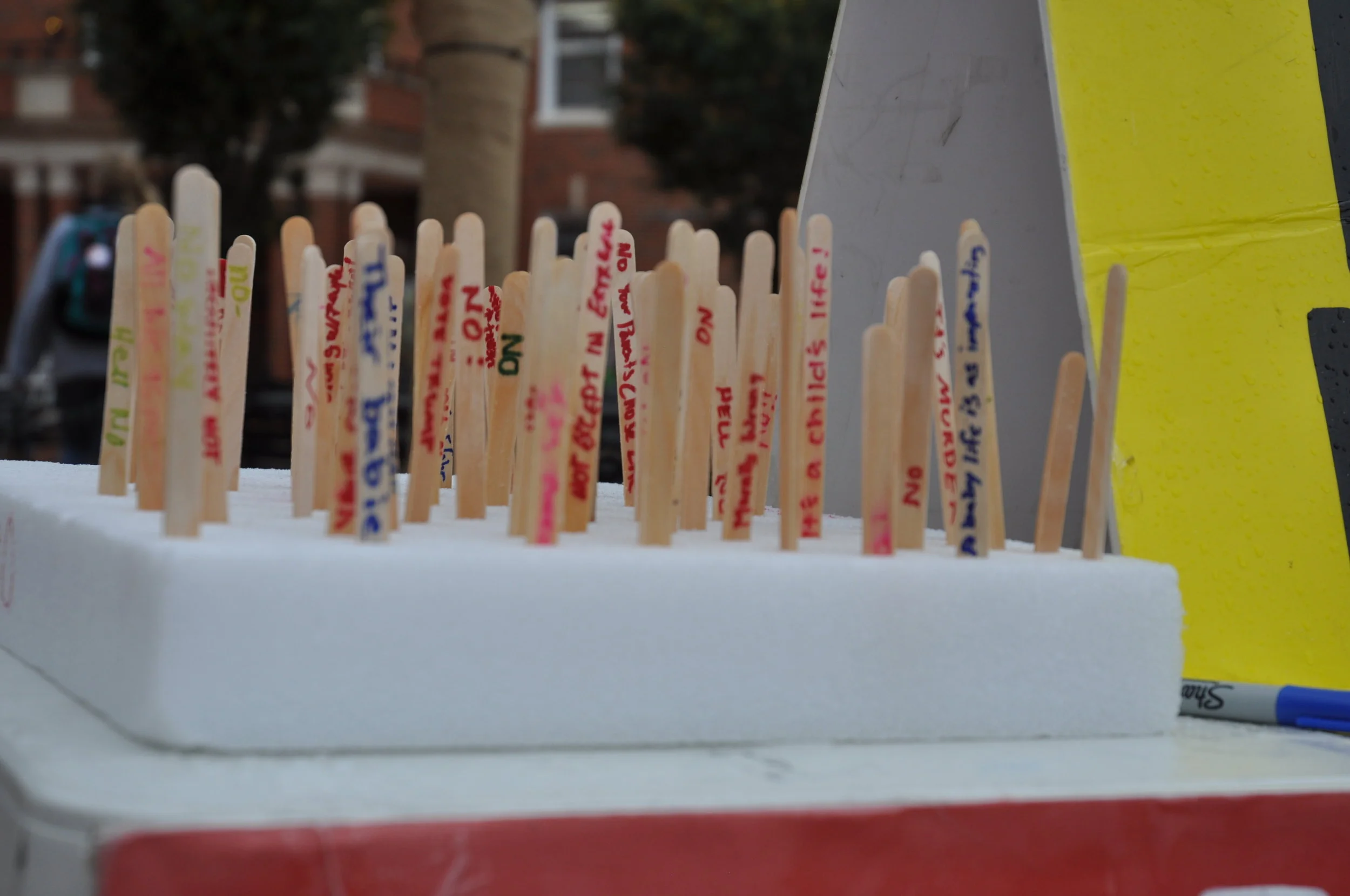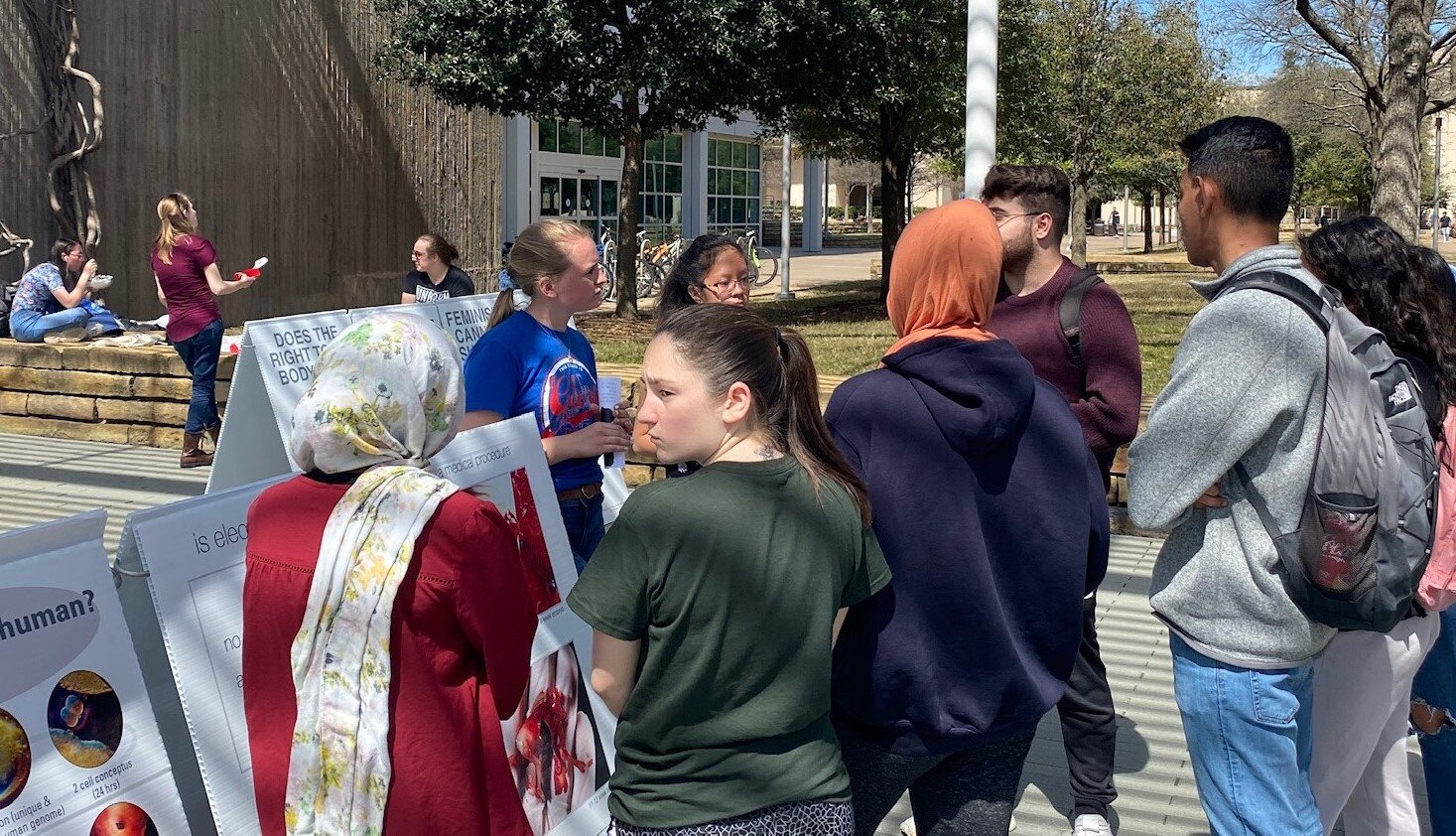JFA Volunteers and Staff Share True Stories of a Different Kind of Conversation:

More Stories of Conversations:
Fall 2023 intern Catherine Gimino tells the story of what happened when she interrupted Helen’s walk to class at WSU.
Answering the Hard Cases
In almost every conversation about abortion, we can expect people to ask about “hard cases” such as rape, incest, and life-threatening pregnancy complications. In JFA’s August 2023 Impact Report, JFA trainer Kristina Massa beautifully illustrates JFA’s framework for addressing these questions through the story of a conversation with “Brad” in April 2023.
A Changed Heart at Fort Lewis
In JFA’s July 2023 Impact Report, Rebekah Dyer shares about how God gave her the gift of seeing both a shift in belief about abortion and a new commitment to Christ in the span of an hour. Thank God with us!
Attitude Can Make or Break the Conversation
In our June 2022 Impact Report, Rebecca Hotovy tells the story of her conversation with “Chris” at OU in 2015.
A Big Change for Chase
In this newsletter, Tammy Cook describes a conversation that happened in fall of 2021 at Wichita State University.
Jack Changes His Mind…Three Times
In this Impact Report for July/August 2021, Executive Director Steve Wagner tells the story of one of his favorite conversations from his JFA work - a conversation from 2013 in which “Jack” had three changes of mind in about an hour and a half.
A Conversation with a Planned Parenthood Volunteer
Sometimes it’s a blessing in disguise to be in the dark. In this Impact Report, JFA trainer Mary St. Hilaire describes an unforgettable conversation with “Ashley” that highlights a valuable lesson for all of us: Give the benefit of the doubt. Because Ashley wasn’t forthcoming with her views, Mary was allowed to simply enjoy Ashley’s company as they talked. It appears this helped Ashley consider Mary’s pro-life beliefs with a more open mind.
Aubree Changes Her Mind
“When I made that connection it was like a light bulb went on in her mind. Before leaving, she asked ‘Can I change my answer?’” “Aubree” didn’t like abortion and believed life begins at conception, but she still thought abortion should remain legal. Find out why in this engaging outreach story, and look for the critical connection JFA Intern Rebekah Dyer made to help Aubree change her mind.
A New View of Abortion... And Pro-Life Advocates
What can break down barriers between those who disagree, help them reconsider their assumptions, and bring them closer to the truth together? JFA Intern Mary St. Hilaire sheds light on an answer with this vivid outreach story from Trinity University in San Antonio.
One Conversation Changes One Life
Joe was concerned about the suffering of children, and that’s why he thought abortion should remain legal. JFA volunteer Rebekah listened, asked questions, found common ground, but also gently challenged his perspective. Read her reflection to find out what happened next.
A Four-Year-Old Helps Save a Life
In this Impact Report, we share a story that’s been passed down from the early days of JFA. The lead character is a four-year-old we’ll call “Rachel.” If Rachel was able to help save an unborn child’s life, can’t we do the same? JFA recently released a K-4 lesson plan for free on the web. With it, we hope we can enable thousands like you to teach other children (and adults!) to do what Rachel did so naturally: speak up for those who can’t speak for themselves.
I Didn’t See This Coming
In this Impact Report, JFA intern Kaitlyn Donihue shares a story from JFA’s first campus outreach event at Fort Lewis College. The conversation ended very differently than she expected. Note Kaitlyn’s important admonition to take note of what God might be doing in a person’s life.
Growing Up with Justice For All
When Jeremy Gorr showed up in Phoenix to teach a seminar in April 2019, he was met with a surprise: Rylei, a high school student he helped train in 2017 and 2018 in Colorado, was now a student at Arizona State University and eager to become active changing hearts and minds at ASU. In this Impact Report, Rylei shares how JFA training helped her talk to her pro-choice friends about abortion.
Empathy Opens the Door
JFA trainer Jon Wagner shares his conversation with “Eva,” a student whose pro-choice view stemmed from her experience in foster care. Notice how Jon invited Eva into the dialogue, starting with common ground rather than an argument. See also how “Trotting Out the Toddler” revealed that, if the unborn is a human being, abortion is not a compassionate solution to the difficulties surrounding unplanned pregnancy.
You Have to See Firsthand
As a college freshman, Julia held strong pro-life convictions, bolstered by her faith and her own scientific research. But Julia didn’t know what she could do to make a difference - until she observed a JFA outreach event on her campus. In this Impact Report, Julia shares how compelling it can be to witness a different kind of conversation about unintended pregnancy and abortion firsthand.
Americans are Weird!
And Why That’s Fantastic
In this conversation, a British student sees why something that seemed crazy to him at first, Americans discussing abortion, is actually not crazy at all. This is a beautiful model of how asking just a few open-hearted questions can help a person go from seeming completely closed to the pro-life position to actively engaging the question of whether the unborn are human beings with equal value to the rest of us.
“My Mom Wanted to Abort Me.”
In this conversation, JFA Trainer Jeremy Gorr saw first-hand how a personal story can help open a person’s mind and heart to change. We’re reminded that we can train Christians in good conversation skills and good arguments, but ultimately we depend completely on God and his work behind the scenes to change hearts and minds.
Worth the Interruption
In March, after teaching many of his high school students using JFA materials, Spencer Stewart brought twenty of them to our University of Kansas outreach event to watch JFA mentors in conversation and to give the students an opportunity to join in. In this Impact Report, Spencer and several of his students share about their experiences.
You Can’t Learn This in a Classroom
JFA training is not just theoretical. JFA volunteers are able to immediately put what they learn into practice alongside supportive JFA mentors. In these stories, you'll see how JFA mentors supported outreach volunteers at our March 2018 University of Kansas (KU) outreach, praying for them, modeling good dialogue, and participating with them in their first conversations.
A Living Room Conversation
JFA trainer Grace Fontenot shares a conversation she had with “Heidi,” a young woman she met, not during an outreach event, but in an everyday-life setting. This story is told in three parts, and covers the following topics: Part 1: Morality and Legality; Part 2: The Unborn - A Living, Human Organism; Part 3: Human Equality and Women’s Rights
Reaching Pro-Choice Christians
Why do we tend to think that most Christians are against abortion? Ann’s and Joanna’s experiences, described in this Impact Report, indicate that many Christians are more tolerant of abortion than we think. Ann is a JFA volunteer from four years ago and is currently studying in a university in Japan. Her story shows how one person can make a big difference in a community of Christians, kindling affection for all involved in unwanted pregnancy.
In the introduction to this Impact Report, Steve Wagner emphasizes that you can’t judge whether or not you’re successful in a conversation by looking at the results. So when we share stories where we do see some specific good result or moment of impact, we try to keep this reality in mind.
Stories like the ones shared here, from JFA staff members Susanna Buckley, Jeremy Gorr, and Rebecca Haschke, are simply a special grace from our loving Father. Let’s enjoy his work!
In this Impact Report, Susanna Buckley, intern from Virginia, shares a beautiful conversation from our recent Purdue University outreach. She saw God work through two well-placed questions to help a young woman make connections to her experience which surprised even her, convincing her that abortion is not a reasonable option for responding to suffering and difficulty.
In “Two Buckets,” Tammy Cook shares one concept that helps people who are reluctant to say abortion should not be legal because “I can’t tell others what to do.” Through the conversation, which Tammy shares in vivid detail, she also models a number of other important conversational tools, including trotting out a toddler, asking questions with an open heart, and using visual aids.
Lessons from a Conversation at Wichita State University
In this letter, JFA’s Director, Steve Wagner, shares three things that you can use to prepare for conversations: (1) In the third paragraph, he summarizes the case for the pro-life position in a memorable way. (2) He then shares an analogy that builds common ground about the difficulty of seeing early embryos as valuable, but also challenges listeners to let facts determine how they act towards the embryo. (3) Finally, he gives some perspective on how to judge whether or not a conversation is worthwhile.
A Lesson in Love
“Sam” was so rude at the start of his conversation with JFA trainer Rebecca Haschke that she nearly gave up talking to him altogether. Despite her inner frustration, she repeatedly made a choice to love him and was surprised by the conversation that followed. Because of Rebecca sought to understand him, found common ground with him, and humbly shared aspects of her own experience, Sam began to open up about his past. As you read, notice how choosing to love, even when it was difficult, provided an unexpected opportunity for healing to begin.
A New Advocate in Forty-Five Minutes
In this Impact Report, JFA Intern Grace Fontenot shares about Bryan, who she met when he was proclaiming his pro-choice views during a JFA outreach event. Several minutes later, after talking to Grace, Bryan started actively persuading his friend DJ to be pro-life.
Grace's story illustrates that anyone—using some simple tools, including questions, pictures, and a calm demeanor—can engage people in conversation and help them change their minds about abortion. This is especially true if the pro-life advocates work as a team.
#Mindblown
"Brian" felt that because he had religious reasons for his point of view on abortion, he was disqualified from making a case that abortion should not be legal.
In JFA's May 2016 Conversations Letter, Rebecca Haschke describes in vidid detail how in just a few minutes, she helped him reconsider this sentiment. You can imitate her manner and her sequence of questions when you confront this sort of concern in conversations with friends and neighbors.
Lightbulb in Los Angeles
In this Impact Report from 2015 CK describes specific decisions she made in the course of a conversation that helped a UCLA student, "Jenny," come to look at abortion differently.
Charity on the Metro
Our trainers tell this classic JFA story during presentations and seminars. In this Impact Report from 2015, you can also read the "story behind the story."
The Student Becomes the Trainer
In his first conversation of the day, Keawe Bridges built a bridge for a pro-life student who didn't know how to defend the unborn. Then, in another conversation with his pro-life friends and a pro-choice student, he was able to build a bridge for all of them at one time. This JFA Impact Report for November 2015, written by Joanna Wagner, includes both of these stories along with numbers that illustrate JFA's overall impact in 2015.
Confidence Creates Conversations
Like so many of us, Andrew did not often have conversations about abortion. He was pro-life, but he lacked confidence. Then he participated in the Justice For All (JFA) training program in Fall 2015.
In this Impact Report from March 2016, JFA trainer Jeremy Gorr reflects with Andrew on Andrew’s experience with JFA. Along the way, they illustrate how confidence is built little by little, through the right kinds of activities.
Reflection on the Justice For All Boulder Outreach - 2003
"This experience wasn't a highlight of my week, or even semester, but something I will treasure and remember for the rest of my life." When Ashley found herself in a small group of strangers at a Justice For All outreach event at the University of Colorado at Boulder in 2003, she found that the past she was ashamed of gave her a unique opportunity to share Christ's love with others and to experience Christ's love herself. Read about Ashley's amazing experience in her own words.
Can a Crowd Have a Conversation?
Navigating a one-on-one conversation about a controversial subject can be difficult. Now add nine more people with varying opinions. In JFA's September 2015 Conversations letter, JFA trainer Rebecca Haschke shares how a conversation with a crowd impacted a number of students at the University of Arizona.
Miriam's Seminar Ends Up in the Abortion Clinic
A friend pulled Miriam out of bed one Saturday morning to take her to a pro-life training seminar JFA missionary Jon Wagner had arranged when he was a student at Azusa Pacific University. It was the first in a series of small steps that ultimately led to a big decision — right inside an abortion clinic. This Impact Report from 2013 has the story.
From Mum to Mom
This Impact Report from 2012 shares the story of two young parents we met in Colorado, "Gloria" and "Josh," as they were considering whether or not to continue parenting...and whether or not to tell anyone. Now, they are happy to share the story of their "William" with anyone who will listen.
Crippled by Fear? Rise and Do Feet Work.
In this Impact Report from 2014, three JFA volunteers share in their own words how participating in Justice For All's seminar and outreach events helped them to overcome their fears related to creating conversations about abortion.
The Formula for Saving a Life is SW+FW=RW
Trained by JFA as a high school senior, Conny then helped save a child's life. In this Impact Report from 2012, she tells her story.
Crash Course Training Helps Save a Life
Amanda made a beeline for our table, knelt down, and drew her line directly below the conception photo, signifying her view that human rights begin at that point. Later that day, through a conversation with her friend "Kim," she helped save a child we call "Lucy" from abortion. Read the whole story in this Impact Report from 2012.
Labor Days
This Impact Report from 2014 tells the stories of Anne Marie, Sarah Mary, Jacqueline, Olivia, Maggie, Judy, and Kristi in their own words.
JFA’s Three Essential Skills Are the Life of the Party
In this Impact Report from 2013, Kansas volunteer Anthony Trent shares in his own words the story of how he went from the fire of his second JFA training experience to the frying pan of a party of naysayers. He was ready to turn the debate into a dialogue.
The Power of One
Our team is comprised of more than just our full-time staff. We are frequently joined in the field by dedicated volunteers, some of whom have experiences and special gifts that help us in our work. Angela is one of these volunteers, and in this Impact Report from 2013 she shares her story.
Jordan Crosses the Jordan
First she participated in Seat Work and Feet Work, then Jordan took the next step of ministry that we call "Repeat Work" and talked to a total stranger in a coffee shop. This Impact Report from 2014 explains what motivated this bold move, and tells the story of what happened next.
JFA Mentors: Indispensable
How did Rebecca come to have the confidence to start her own conversation about abortion? JFA's intentional mentoring process. Rebecca's story, shared in this Impact Report from 2014, shows the steps JFA mentors take to help volunteers like Rebecca learn to start life-changing and life-saving conversations.
Taking Paul to Heart
The apostle Paul encouraged Timothy to pass on to faithful souls what Paul had taught him. Like Paul, we want to impart our knowledge and wisdom to other capable leaders. This Impact Report from 2013 illustrates how we are putting that principle into practice through the story of six summer interns.
Mission Trips - Catalysts for Change
Many Christians have found that family mission trips can be an effective way to immerse themselves in a learning environment. It doesn't take a trip out of the country to accomplish this, though! The Boyes family traveled from OK to TX for a three-day Justice For All mission trip. Read their story in this Impact Report from 2012.
Ready and Eager for the Next Conversation
Our hope at JFA is that the pro-life students with whom we interact will take the tools they've learned in our seminar with them into their everyday lives. This Impact Report from 2015, tells the stories of a few of these students who have become ready and eager to create conversations about abortion.
From Hurt to Healing
Read this story to see why Christina, with three abortions in her past, told staff member Tammy Cook just two days after seeing abortion images on the Justice For All Exhibit, “Thank you so much, Tammy. I feel like you’ve given me my life back."
Jinny Helps Save a Child's Life
Jinny risked offending her friend and helped save her friend's child from abortion. Here's the story.
Cecilia Helps Save a Child's Life
As our team ate a meal at a Colorado restaurant in 2006, our server told us an amazing story of how the Justice For All Exhibit had impacted her, her friend, and her friend's baby back.





